The Jewish Press




INTRODUCING
 ANNETTE VAN DE KAMP-WRIGHT Jewish Press Editor
ANNETTE VAN DE KAMP-WRIGHT Jewish Press Editor
The Jewish Federation of Omaha is excited to share the beginning of a new annual initiative we are calling Tapestry: A Celebration of Jewish Learning. This year, Tapestry will take place Friday, May 31 - Sunday, June 9 and will feature guest scholar, Rabbi Joseph Telushkin. The JFO and its agencies, Jewish organizations and synagogues will offer a variety of programs to engage our entire community.
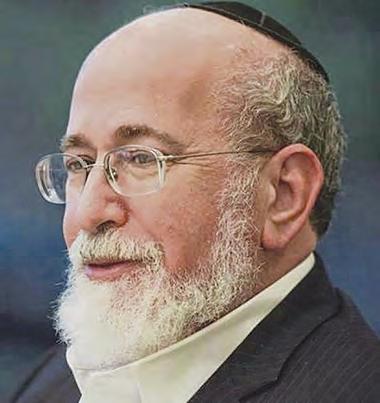
“Joel Alperson originally presented the idea to the JFO Board to bring Telushkin for an extended scholar in residence,” JFO CEO Bob Goldberg said, “And Joel has been our point of contact with Rabbi Telushkin. This would not have happened without him.”
“Rabbi Telushkin’s appearance in Omaha will be meaningful,” Joel Alperson said, “because I’m aware of no other
rabbi who is as highly a desired speaker, regardless of whether the audience is Reform, Conservative, Orthodox, or even non-observant. His comments are tremendously insightful and yet gently offered. He brings Jewish meaning to our 21st century lives and I expect that those who see him only once will want to see him again. For ten days, the Omaha Jewish community will enjoy a very rare and special experience.”
Tapestry is an investment into strengthening our Omaha community’s Jewish literacy. Each year, The Jewish Federation of Omaha will bring a Jewish scholar to Omaha to collaborate with our congregations, JFO agencies, and partner organizations. Each host organization/agency will customize their own program during this ten-day period of learning. Host organizations/ agencies will determine topic, mode of preferred learning
See Tapestry page 2
REGULARS


















14TH,






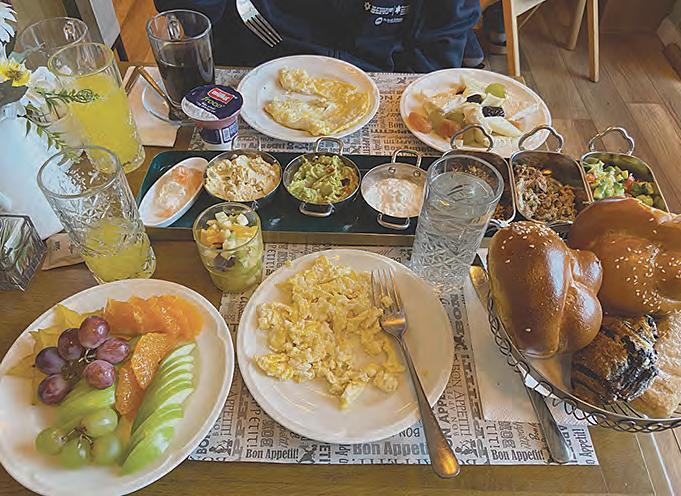
From Feb. 28 through March 8, together with my wife Kim and JFO President Nancy Schlessinger, I traveled to our Partnership region in Israel. While there is much more to say and share (and we will over the next few weeks), here are my initial takeaways from the trip.
Most Israelis have settled into a routine. But: it is an uneasy routine, filled with weariness and uncertainty. People are out on the trains and buses, on the streets and in the shops, at the banks and at the beach. Life goes on. But October 7 is seared into their souls, and they are making great sacrifices daily, See Bob’s Israel Journal page 3
MARCH 29, 2024 | 19 ADAR II 5784 | VOL. 104 | NO. 23 | CANDLELIGHTING | FRIDAY, MARCH 29, 7:28 P.M. New Nebraska Voter I.D. requirements Page 4
of Passover: Why will this year’s seder be different from all the other seders of our life? Page 10
additions to
Veret Collection Page 12
Taste
New
the Kripke-
WWW.OMAHAJEWISHPRESS.COM | WWW.JEWISHOMAHA.ORG SPONSORED BY THE BENJAMIN AND ANNA E. WIESMAN FAMILY ENDOWMENT FUND AN AGENCY OF THE JEWISH FEDERATION OF OMAHA
Spotlight 7 Voices 8 Synagogues 10 INSIDE
NAOMI FOX
JFO Assistant Director of Engagement and Education Jewish youth ages 12-18 are invited to an afternoon of Tikkun Olam during J-Serve: The international day of Jewish youth service. April 14, Tzedek Teens and BBYO together will plan JServe this year, and we are excited to announce our project! We will
partner See J-Serve page 2
BOB GOLDBERG JFO CEO
J-Serve: An international day of Jewish youth service
SUNDAY, APRIL
2024 Bob’s Israel Journal: part 1
Rabbi Joseph Telushkin
A dancer, a photograph, a watercolor
ESTHER KATZ
JCC Performing Arts Director
Every year before our JCC Dance Training Company concert we ask Mark Kirchhoff of “On the Mark Photography” to take headshots of our Training Company dancers. He also takes large group, small group, and individual photos of the dancers in costume. In 2023 something special happened. For appeal and an example of excellent dance position form, the photo of Grace Caskey caught the eyes of Esther Katz, Performing Arts Director and Mark. It didn’t stop there.
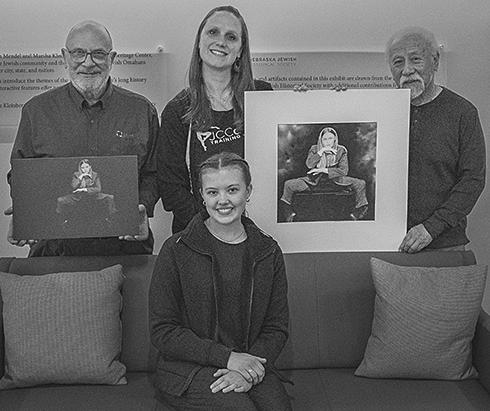
“On the Mark Photography” had a print made of the photo,
Continued from page 1
experience, and setting that best serves the age group and interests of their participants. This year Rabbi Telushkin will engage in a variety of sessions, in a variety of formats, determined by our host organizations/agencies.
“As a respected author, lecturer, and teacher of Jewish thought and ethics,” Bob Goldberg said, “Rabbi Telushkin focuses on strengthening the commitment of Jews all over the world. We’re very fortunate to have him as a remarkable resource for our community.”
Our time with Rabbi Telushkin will culminate with a community-wide program, hosted by The Jewish Federation of Omaha on Sunday, June 9 from 2-4 p.m., in the Shirley and Leonard Goldstein Community Engagement Venue at the
and Mark showed the print to his friend, watercolor artist Telagio Baptista. Telagio has exhibited his work internationally, including at the Staenberg Omaha JCC in the Eisenberg Art Gallery. He periodically conducts watercolor painting classes at the JCC. He was intrigued by the image and offered to create a watercolor painting of it. And he did. As shown in the photo, Telagio presented his artwork on March 13. Pictured seated: Grace Caskey; back row: Mark Kirchhoff, left, with photograph; Esther Katz and Telagio Baptista with watercolor. Once both pieces are placed in matching frames they will be on display in the Performing Arts Department.
Staenberg Kooper Fellman JCC Campus, 333 S. 132nd Street. Tapestry aims to inspire Jewish literacy, provide opportunity for community members to engage with a prolific scholar and serve as a springboard to further educational explorations as individuals, and as a community. We hope everyone will find their way to engage with Rabbi Telushkin and with each other during our First Annual Tapestry: A Celebration of Jewish Learning This program has been made possible thanks to the generosity of the Jewish Federation of Omaha, the Herbert Goldsten Trust, Ann Goldstein Educational Programming Endowment Fund and the Klutznick Fund, all at The JFO Foundation, with accommodations for Rabbi Telushkin provided by Chabad of Nebraska. Stay tuned for more information about the individual parts of this program!
Starting at 12:30 p.m. at the JCC, we’ll embark on our mission to make a positive impact on our local community. Lunch and snacks will be provided. Plus, there will be exciting giveaways and prizes to look forward to earning for attending. Sasha Denenberg and Asher Tipp are the BBYO board members involved in the planning of J-Serve this year. When asked why it is important to do this type of work together as a Jewish community, Sasha shares, “In these difficult times with so much negativity and conflict in the world, it’s more important than ever for us to remember the core beliefs and values that bring light to our lives. While some embrace hatred and violence, we celebrate love, compassion, and the inherent dignity of all people. We celebrate Tikkun Olam. When others revel in tearing us down, we take pride in building each other up. At J-Serve we will come together and be a force for good. We’ll embrace the happiness that comes from our ideals of peace, kindness, and bringing more love into this world. We’ll start by being there for one another and improving the community together.” Asher adds, “This year’s event will be meaningful because we will be doing hands-on work in our community and growing connections with each other as we do it. It is our responsibility to keep our Earth clean to provide a better world for future generations to come.”
Not only will you be making a difference, but you can also earn valuable service hours for school as needed. More details will be shared after registration. Please join us for this opportunity to come together, have fun, and make a meaningful contribution.
For the project, teens (and pre-teens!) can be dropped off at the JCC at 12:30 p.m. and picked up from the JCC at 3:15 p.m. Any questions, please reach out to Tzedek Teens facilitator Naomi Fox nfox@jewishomaha.org or 402.334.6424 or BBYO Director Jacob Geltzer at 402.334.6404 or jgeltzer@jc comaha.org
Register for J-Serve 2024 here.





2 | The Jewish Press | March 29, 2024 News LOCAL | NATIONAL | WORLD Mazel Tov, Aaron! Love, Mom, Dad, brothers, sisters and grandparents We are so proud of your achievements – membership in NHS, varsity letter in tennis and a Merit Award from B.E.S.T.T.
The annual Graduation Issue will publish this year on May 24, 2024. Senior photos will run in that issue and we know you’ll want to highlight the achievements of your high school graduate! Congratulatory ads are available in two sizes. Limit of 25 words. Size B | $99 Size A | $36 Love, Mom, Dad, brothers and sisters We are so proud of your achievements –membership in NHS, varsity letter in tennis and a Merit Award from the Band. Photohere Congrats, Rachel! CONGRATULATE YOUR GRADUATE CONGRATULATE YOUR GRADUATE ORDER FORM Name Address City, State and Zip Phone __________________________________________________________ Size A O Size B O Photo enclosed O Check enclosed for $ Send check and photo to The Jewish Press, 333 So. 132 St., Omaha, NE 68154 by May 7. TAPESTRY J-Serve Continued from page 1 with the Volunteer in Parks organization through the City of Omaha to beautify a local park. Together, we’ll prune plants, pick up trash, and plant flowers, all while enjoying the company of friends and making new ones!
Photohere
Bob’s Israel Journal
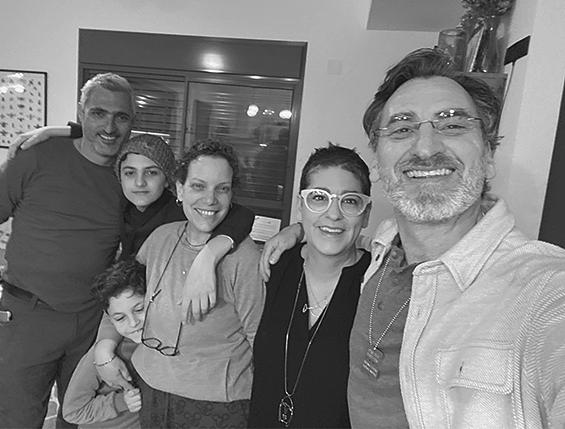
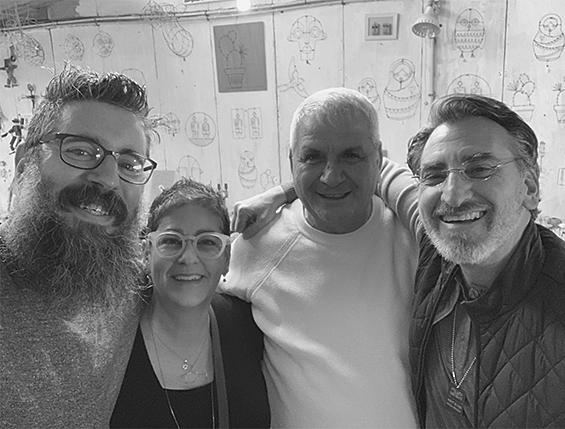
Continued from page 1
unsure of what will come next.
The return of the hostages is top of mind and the top priority for all.
There is consensus amongst Israelis that Israel has a moral obligation to eliminate any future threat from Hamas.
There is general consensus with residents in the north that war with Hezbollah is not a matter of if, but when. All would like to avoid such a war with Hezbollah, but no one sees how residents of the evacuated communities can return home until the threat from Hezbollah is addressed.
There is strong consensus that war with Hezbollah will come with a very heavy price AND Israel will win. There is absolute confidence in this.
Our presence was greatly appreciated by our Israeli friends. They told us this over and over again, and they were surprised that we would make the effort to come now.
I am grateful that the Jewish Federation and the Jewish Agency had the wherewithal to build this platform called Partnership because my life is better because of it. I am grateful that our community in Omaha saw the value in building bridges with Israel and has invested in and inspired generations of our community members to strengthen bonds with Israel through one-on-one relationships through Partnership experiences.
FEBRUARY 29
Traveling is fun, but the getting to the place you are traveling to is not always as much fun. We arrived today at our hotel in Nahariya after 24 hours of travel from the time we left home in Omaha. We flew first to Minneapolis, then to Paris, and then to Israel. The second and third flights had very short connections so we were rushed and on both of those flights we were sitting next to and in front of young children and babies who, like me, don’t always love the discomfort of today’s cramped air travel. Their experiences added to our own :).
After arriving at Ben Gurion and going through passport control, we walked down the long walkway to baggage claim past posters of the hostages that adorned both sides of the walkway and an installation of dog tags that say “Bring Them Home Now” in Hebrew and English.
After getting our bags, we had the good fortune of seeing former Omahan Ruti Margalit, who has been living in Israel for ten years and was waiting for a friend to arrive from New York. I jokingly thanked her for welcoming us so kindly. Our kids grew up together and it gave us a quick chance to catch up. In case you didn’t know, almost everything connects to Omaha.
After a quick stop for our shot of Aroma (if you know, you know), we stood in line to get our rental car and eventually made the slow drive through traffic up to the north. We realized once we made it past Haifa that the GPS wasn’t working and after a bit of googling found that the IDF has blocked GPS in the north to disrupt Hezbollah rockets, so our Waze and Google Maps stopped working, but luckily Kim has done this
IN THE NEWS
The Old Avoca Schoolhouse in Avoca, Nebraska will be streaming three online Klezmer Fiddle Tunes Workshops for violins, violas, cellos, basses, mandolins, soprano recorder, and alto recorder.
drive and got us to our destination.
After checking in to our cute room at the Casa Boutique Hotel and washing up, we went for a tasty dinner of salads and pasta at Bordo Restaurant on the strip in Nahariya. The weather is nice. It was 75 degrees when we arrived at the airport and around 55 degrees now.
We are just a few blocks from the Mediterranean Sea and relatively close to the Lebanese border and while life goes on and people are out and about, I can feel a weariness and a tenseness from the uncertainty of what the war will bring next.
MARCH 1
It was a good day today. Had a good sleep last night and woke to the cool morning air. Took time getting going and went downstairs for breakfast in the hotel. The hotel manager came over and thanked as for being here (obviously tourism has been hurting). He told us to sit wherever we wanted and they would serve us. Sounds of classic jazz filled the room. We found a small table, asked for coffee and orange juice, eggs, and salads and out came a smorgasbord of good stuff that would have taken a group of four to finish. It was delish.
We then drove to visit our friend Koby Sibony in his art studio. Koby and his family live on Kibbutz Lohamei HaGetaot. This kibbutz is also the home to the Ghetto Fighters Museum and the Kuperman Musuem. Koby is a great wire artist. He had customers there and we hung out for quite a while visiting and seeing his new work. Another friend, Albert Ben Shloosh came over as well and we all hung out until we went to pick up Koby’s almost one-year-old son Nuri at daycare on the kibbutz and went to their house and hung out with Koby, his wife Yael, and played with Nuri and their dog. After an hour or so there, Albert, Kim and I went for a light lunch at a restaurant on the kibbutz that proudly noted on its menu that they serve Nebraska beef. After lunch, we said goodbye to Albert and we went back to the hotel for a quick nap.
We then went for Shabbat dinner at the home of Elad and Noa Tene and their two young boys. Noa has been receiving cancer treatment and Elad just returned home yesterday from his reserve army service. He has been away since October 7. The boys were cute. The older son is 13, is into anime and Charlie Parker, and plays the saxophone. The younger son likes Pokémon and dancing along to YouTube videos. Elad and I visited at length about current events on their patio. They cooked up lots of food and we ate until we couldn’t. It was great to be with them and lovely for them to have us over. Noa, Elad, Albert, and Koby are very special friends that have been a part of our family for many years now thanks to Partnership2Gether. Partnership is designed to create one-toone relationships between those in Omaha and our consortium cities and in Israel’s Western Galilee. My life, and Kim’s life, have been made significantly more meaningful and fulfilling because of the friends we have thanks to P2G. Shabbat Shalom and Laila Tov.











The Workshops will be on Tuesday, May 14, 7 p.m., Central Daylight Time, Wednesday, May 15, 10 a.m., Central Daylight Time, and Friday, May 17, 7 p.m., Central Daylight Time. Different tunes will be played at each session. We will read, play, and discuss various survival skills for these charming pieces. A treble clef version of the sheet music for the tunes being played will be displayed on the screen during the workshop. There is limited enrollment, and pre-registration is required. The cost for each workshop is $10. The cost of each optional book is $15 (includes shipping if ordered with workshop registration).
ORGANIZATIONS
B’NAI B’RITH BREADBREAKERS
The award-winning B’NAI B’RITH BREADBREAKERS speaker program currently meets Wednesdays via Zoom from noon to 1 p.m. Please watch our email for specific information concerning its thought-provoking, informative list of speakers. To be placed on the email list, contact Breadbreakers chair at gary.javitch@gmail.com
For more information, and to register: https://greenblattandseay.com/workshops_klezmer.shtml
INFORMATION
ANTISEMITIC/HATE INCIDENTS
If you encounter an antisemitic or other hate incident, you are not alone. Your first call should be to the Jewish Community Relations Council (JCRC) in Omaha at 402.334.6572, or email JCRCreporting@jewishomaha.org. If you perceive an imminent threat, call 911, and text Safety & Security Manager James Donahue at 402.213.1658.

The Jewish Press | March 29, 2024 | 3 Home Appliance Heating & Cooling 402-391-4287
Cohen Marty & Kathy Cohen A member of the franchise system of BHH Affiliates, LLC.
situated on
steps away from schools
retail.
townhouse,
handles
care,
removal,
periodic exterior painting.
appreciate a spacious
with raised ceilings and a fireplace. The eat-in kitchen has a dinette, breakfast bar, pantry, and a main floor laundry!
primary bedroom has a walk-in closet, large vanity, and walk-in
level
perfect
get together
accesses the private backyard.
Anne
Affordable true ranch
a wooded lot just
and
Easy living
HOA
lawn
snow
and
You’ll
Living Room
The
whirlpool! The finished lower
is
for a casual
and
Cohen | 402-690-1591
17402 Polk Street | Cinnamon Creek / Townhouse | $295,000 Marty
Elad and Noa Tene and boys with Kim and Bob at the Tene house for Shabbat dinner.
Koby Sibony, Kim, Albert Ben Shloosh, Bob in Koby’s art studio on Kibbutz Lohamei Hagetaot.



New Nebraska Voter I.D. requirements
SHARON BRODKEY JCRC, Executive Director
Did you know that Jews were not allowed to vote in America until the early 19th century? It’s hard to imagine what life and our American Jewish community would look like today if we had never been given the right to engage in choosing our local and national leadership. It’s actually concerning to imagine American Jews not participating in this most cherished right.

It is often argued that the thriving American Jewish community’s success, over- representation in major fields, and accomplishments are because we actively participate in our democracy. When we had the opportunity to build a Jewish nation, one where we could determine for ourselves what Israel would look like and and how it would be governed, we chose democracy. Rabbis, modern Jewish philosophers, and thought leaders across many streams of Judaism, teach that voting is not merely a right and civic duty, it is a mitzvah. Democracy and pluralism are at the core of JCRCs’ work in more than 130 communities in the United States. In Omaha, our Civil Rights Committee is led by attorney and community volunteer Sara Rips. Last week, Sara invited Heather Engdahl, Director of Voting Rights at the nonpartisan Civic Nebraska, to speak with the committee about the impact of the new Voter I.D. requirements. Beginning with the 2024 primary elections on May 14, Nebraska voters will be required to present valid photo identification to vote. Heather spoke about how currently registered voters may or may not be affected, acceptable forms of identification, where to get acceptable identification, what voters by mail need to make sure their ballots
are counted, and answered many questions.
JCRC also partners with the League of Women Voters (LWV), one of the oldest and most trusted nonpartisan, civic nonprofit organizations in the United States. The League’s Voter Services promotes online voter registration, voting early by mail, ex-felon registration, English and Spanish voter information, education on ballot initiatives, information on candidate positions, personalized voting information, and the vital VOTE411.org (https:// www.vote411.org/nebraska#candidate-and-ballot-mea sure-information) to provide voters with election information they need from candidates to ballot measures.
Between now and Tuesday, Nov. 5, the JCRC will be sharing valuable resources with need to know to exercise our cherished right to vote. The first place to start is Nebraska Secretary of State Bob Evnen’s website: https://sos.neb raska.gov/elections/voter-id
Another resource that has information on everything from key dates and locating a drop box, to decoding ballots is Civic Nebraska’s Election Central 2024 website.
We will also host a voter registration LWV drive at the JCC in the months between the primary and general elections. Watch upcoming issues of the Jewish Press and our social media pages for dates and times:
Facebook: jewishomaha
Instagram: JewishOmaha
X: Jewish_Omaha
The JCRC is here to answer questions and guide you to resources.






Profiles in Service
LINDA POLLARD
JFO Foundation Endowment Assistant/Staff Writer
The Foundation’s mission is to ensure the ongoing and future sustainability of Jewish Omaha by managing donor assets and distributing funds. These funds are instrumental in providing support for scholarships, grants, special projects, programs that benefit both Jewish Omaha and secular and Jewish charitable organizations near and far chosen by our donor-advised participants. Your support enriches Jewish Tomorrows.
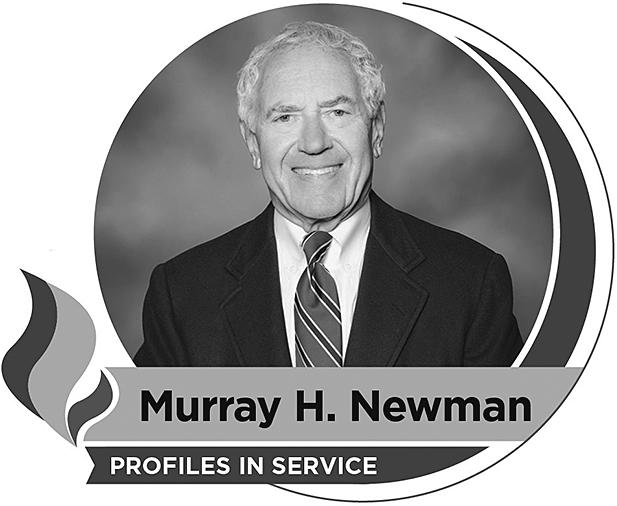
We take great pride in our dedicated board members, each of whom plays a vital role in advancing our mission. Throughout the year, we will be spotlighting members to recognize their valuable time, talents, and contributions to making our community stronger.
MURRAY NEWMAN has served on The Foundation board since 1983 as a founding member, and has held the position of president.
WHAT ATTRACTED YOU TO BE ON THE FOUNDATION BOARD?
In a word, it is “Continuity”. Keeping our Jewish community alive and sustained far into the future…. establishing endowments to sustain our community as we have become less homogeneous over time. I wanted to be part of that effort.
WHAT ABOUT BEING ON THE FOUNDATION BOARD INSPIRES YOU?
Interacting with amazing fellow Board members and enjoying and working with several executive directors who each bring different skill-sets into their job performance.
WHAT DO YOU SEE AS THE STRENGTHS YOU BRING TO THE BOARD?
Stability, continuity and investment savvy.
WHAT ACCOMPLISHMENTS OF THE BOARD ARE YOU PARTICULARLY PROUD OF?
Keeping our eyes and focus on the longterm mission of The Foundation and not to be swayed by emotions, i.e. the push/pulls of the moment. HAS SERVING ON THE BOARD CHANGED YOUR PERSPECTIVE OF JEWISH OMAHA IN ANY WAY? IF SO, HOW?
I can’t say much. My perspective of the Omaha Jewish Community is engrained in my DNA, having been implanted over several generations.
WHAT DO YOU THINK PEOPLE SHOULD KNOW ABOUT THE FOUNDATION?
I think The Foundation should show bluster and let our community know how wonderful The Foundation has been and continues to be. We do an excellent job of this in our annual report. Keep it up. We have an amazing Foundation for a community of our size. We should “blow our own horn” more and continue to urge our community to join in and be a part of this winner.
Rabbi Geiger’s Weekly Torah Expedition
PARSHA SHMINI
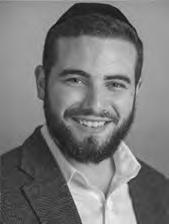 RABBI MORDECHAI GEIGER Beth Israel
RABBI MORDECHAI GEIGER Beth Israel
The Jewish Press
A woman once stopped Rabbi Gold in the supermarket and said, “You must hear this story! My daughter was walking down La Brea Ave and noticed a cop writing a ticket for a car whose meter had run out. This car was parked in front of the Young Israel synagogue, and she realized it must belong to someone inside praying. So the girl asked the cop, would it be ok if I put a quarter in this meter? It must belong to someone in the synagogue, and they can’t come out in the middle of prayer. The cop was impressed and said, “It’s your lucky day; I haven’t printed the ticket yet, so go ahead.” Rabbi Gold appreciated hearing of the good deed and turned to leave. The woman said, one moment, the story isn’t over”. My daughter was cu-
rious to see whose car it was, so she waited a few minutes. The owner walked out of the synagogue, and it was you, Rabbi! Suddenly, Rabbi Gold was much more focused on the story. This week’s Parsha talks about which animals are kosher and which are not. Nachmanides explains that on a spiritual level, you are what you eat. The character traits of the food one eats affect them. We do not eat predators; we don’t want to incorporate their aggressive nature. We also know that one sign for a kosher animal is that it must chew its cud. The Vilna Gaon points out that a cow eats nothing but grass, yet it is so happy with what it has that it brings it back and eats it again and again! So often, we are unhappy with our lot in life, but like Rabbi Gold, we have no idea what is going on behind the scenes. We don’t realize how G-d has protected us and guided us into the best possible life position. We have a lesson to learn from Bessy the cow. If we are truly focused on what we have, we won’t even notice a lack of what we do not.
4 | The Jewish Press | March 29, 2024 SALES POSITION Interested? Send your application to Avandekamp@jewish omaha.org today. We cannot wait to meet you! The Jewish Press is looking for a part-time sales person, with the following responsibilities: • Digital sales • Digital content development • Website development and management
Requirements: • Previous experience in a sales-related role is • a plus • Great customer service skills • Excellent written and verbal communication • skills PART-TIME FLEXIBLE HOURS FOR THE FINEST IN ENTERTAINING ACCESSORIES, HOW CAN YOU THROW A PARTY AND NOT INVITE US? HONEYMAN RENT-ALL Tables • Chairs • Linens • Skirting • China • Glassware • Chafing Dishes Party Canopies • Wedding & Church Displays • Dance Floors • BBQ Grills Coat Racks • Candelabras • Margarita Machines • Chocolate Fountains ENTERTAIN FIRST CLASS The Party Place 402-333-2882 8202 F Street | Omaha, NE 68127 Visit Our Showroom or www.honeymanrentall.com ROOFING SIDING GUTTERS
Temple’s Second Night Seder
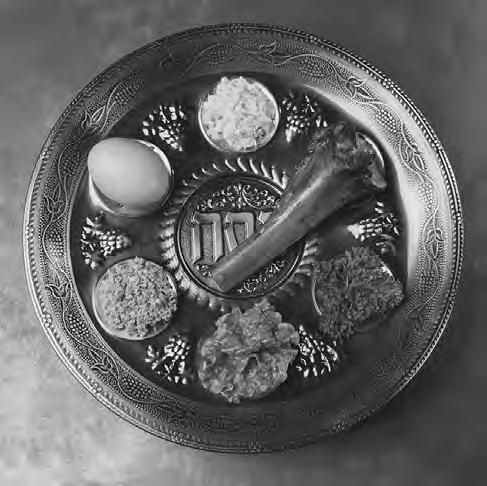
STEFANIE BAGUIAN
Temple Israel Director of Communications
As we gather for Passover, we are excited to once again host our Temple Israel Second Night Passover Seder, Tuesday, April 23rd, 6 p.m.
As we commemorate the exodus of Egypt and celebrate freedom, we ask that you not only bring your presence, but also a piece of you that you will pass down to share. Whether it's a cherished family recipe, a beloved heirloom, or a family tradition that's brand new or generations old, let's come together and share a meaningful evening.
Cost: Adults (13+) $36, Children (Ages 3 -12) $18 and no charge for those ages 2 and under.
Please RSVP online by Tuesday, April 16
The dinner menu for seder is brisket, brown sugar salmon, roasted vegetables, potato kugel, matzah ball soup, gefilte fish, charoset, matzah, chocolate flourless cake.
If you have any questions, please contact Director of Engagement and Events, Mindi Marburg at mmarburg@tem pleisraelomaha.com or call 402.556.6536.
Thank you to the Mark Goldstrom Family for subsidizing the cost of this dinner!
TO SUBMIT ANNOUNCEMENTS
Announcements may be e-mailed to the Press at jpress@jewishomaha.org; or mailed to 333 So. 132 St., Omaha, NE 68154. Readers can also submit announcements -- births, b’nai mitzvahs, engagements, marriages, commitment ceremonies or obituaries -- online at www.omahajew ishpress.com/site/forms/. Deadlines are normally nine days prior to publication, on Wednesdays, 9 a.m.

Shirley and Leonard Goldstein Papers
GABBY BLAIR
Jewish Press Staff Writer
The Criss Library Archives and Special Collections at the University of Nebraska-Omaha is pleased to announce that The Shirley and Leonard Goldstein Papers have been arranged and described by repository staff and are now available for public use.
The collection documents the Goldsteins’ political activism, including international humanitarian work especially on behalf of Soviet Jewish emigres as well as Cambodian refugees and others.
The collection also contains extensive materials about the life of Shirley and Leonard Goldstein and their family.
in Criss Library’s H. Don and Connie J. Osborne Family Gallery.
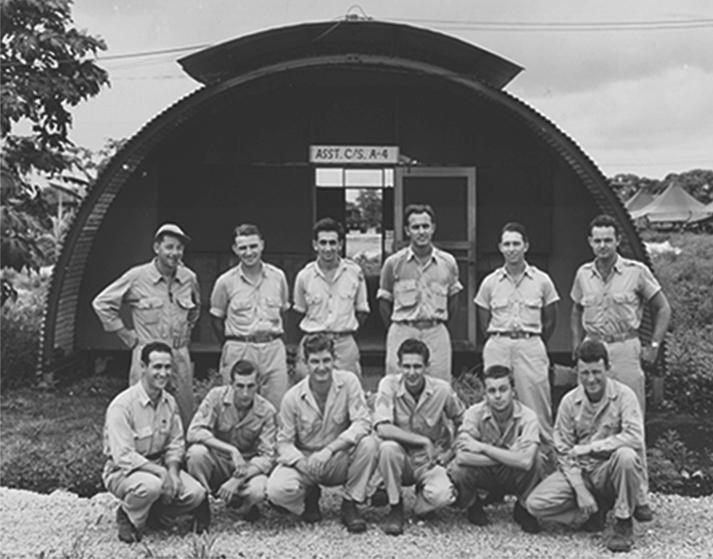
Amy Schindler, Director of Criss Library Archives and Special Collections shares, “A grant from the Shirley and Leonard Goldstein Supporting Foundation allowed for the employment of UNO students to work on the arrangement and description of the collection, including the digitization of the World War II letters. Student employees Anneliese Dunn (2023), Anabel Hazelton (2023-2024), and Sean Summerfelt (2024) processed the collection along with Lori Schwartz, Hagel and Technical Services Archivist. The finding aid, or inventory, to the Shirley and Leonard Goldstein Papers is available online. Items from the Goldstein collection that have been digitized by Archives and Special Collections staff can be accessed through the Finding Aid tool.”
The collection was donated to UNO Libraries in honor of Shirley and Leonard Goldstein by Gail Raznick, Donald E. Goldstein, and Kathy Goldstein, the children of Shirley and Leonard Goldstein, in 2019. The donation followed the exhibition “Shirley Goldstein’s Immigration Rights Legacy: Operation Exodus in Omaha” curated by Jeannette Gabriel, Ph.D.,
The earliest documents are from Shirley’s parents Ben and Selma Gershun in the early 20th century and Shirley’s childhood in Council Bluffs. Shirley and Leonard Goldstein were married during World War II and the collection holds an extensive correspondence of letters Leonard sent to Shirley while he was in training and stationed overseas. The collection also features Leonard’s photo albums and scrapbooks from his service in the U.S. Army Air Corps in the Pacific theater, two of which have been digitized and are available online. The World War II letters have also been digitized and will be made available online in the future.
In the 1970s, Shirley Goldstein made several trips to the Soviet Union where she met with dissidents and witnessed firsthand the oppression of Soviet Jews. Goldstein smuggled in products the dissidents could sell until she came under scrutiny of Soviet authorities and was denied visas to visit. In 1973, Shirley and her friend, Miriam Simon, founded the Omaha Committee for Soviet Jewry, which sponsored the program, Freedom for Soviet Jews.
The collection is available in UNO Libraries’ Archives and Special Collections, located on the first floor of Criss Library. Researchers who are unable to visit UNO may contact Archives and Special Collections for assistance in accessing the collection.
For more information, please contact Amy Schindler – Director of Criss Library Archives and Special Collections at 402.554.6046 or acschindler@unomaha.edu. To access the inventory, finding aid or links to items from the collection that have been digitized thus far, please visit the Criss Library website at https://www.unomaha.edu/criss-library/news/ 2024/02/goldstein-papers-available. php






The Jewish Press | March 29, 2024 | 5 News LOCAL | NATIONAL | WORLD The Jewish Press HIGH SCHOOL SENIOR INFORMATION Name Parent(s)’ Name(s) Current High School College you plan to attend Send by May 10, 2024 to: The Jewish Press | 333 So. 132 St. | Omaha, NE 68154 PARENTS & SENIORS We will be publishing our annual High School Graduation Class pages on May 24, 2024. To be included, fill out the form below with a photo and send it to us or you can email the information and photo to: jpress@jewishomaha.org by May 10, 2024. 2024 HIGH SCHOOL SENIORS Chinese Restaurant CARRY OUT AVAILABLE 402-498-8833 Beer and Wine Available 2068 N. 117 Ave. North Park (117th & Blondo) M-Th: 11-9:30 • Fri & Sat. 11-10:30 • Sun. Noon-9:30 Jade Garden FOR A LIMITED TIME! 12800 West Center Road 330-0200 210 Regency Parkway 392-0400 Sensational N.A., MEMBER F.D.I.C. CD Rates Ask an Enterprise Banker about our latest CD Special and let us help put your money to work for you! MEMBER F.D.I.C. www.enterprise.bank 12800 West Center Road 402/330-0200 210 Regency Parkway 402/392-0400 525 N. 132nd Street 402/330-1050
Army photo from Leonard “Buddy” Goldstein’s scrapbook 1945.
Deep Roots Make Strong Communities
MURPHY SCOTT WULFGAR
B’nai Israel Living History Synagogue hosts their inaugural event as an Anti-Defamation League (ADL) Signature Synagogue on April 2 at noon Deep Roots Make Strong Communities is a free lunchtime event open to all. Dr. Mary-Beth Muskin (B’nai Israel Board Member and Lead Museum Curator) will host ADL guests Trent Spoolstra (Assistant Regional Director, ADL Midwest) and Harmon Maples (ADL Nebraska Community Engagement Manager ) for an informal conversation about Jewish migration in America and how it relates to our local community and the broader history of antisemitism.
This event launches B’nai Israel’s partnership with ADL in the hopes of better connecting the past and present. The three-chair discussion invites the public to participate, as well. “We not only want to help contextualize how ADL fits into the historic narrative of Jewish migration,” says Dr. Muskin, “but also engage directly with Trent and Harmon’s expertise discussing the current rise in antisemitism since the October 7th attack on Israel.”
Dr. Muskin looks at this as, “an opportunity to continue nourishing the longstanding relationship between our community and ADL at a time when those bonds have never been more important. B’nai Israel’s focus in becom-
ing a Living History Synagogue is not to showcase the past by simply preserving its legacy behind glass—but to allow everyone to interact with it in a modern way. In a way that gives us strength, hope, and determination for what lies ahead.”
According to Mr. Spoolstra, ADL hopes to build more meaningful relationships within the community through the Signature Synagogue Series providing real-time resources to mitigate antisemitism on the local level and offer better access to key ADL programs and staff to help serve the congregations (and thereby communities) of Eastern Nebraska and Western Iowa.
“This is an excellent opportunity for collaboration between ADL and B’nai Israel Synagogue,” reflects Mr. Harmon. “B’nai Israel is the oldest continuous synagogue in the metropolitan area and ADL has been fighting anti-Semitism for over 110 years. Our collective history overlaps on many different levels and we look forward to exploring this history as well as future opportunities together.”
A light lunch will be provided, and the event will take place in B’nai Israel Living History Synagogue’s Community Room at 618 Mynster Street in Council Bluffs.
RSVP for the Deep Roots Make Strong Communities program through B’nai’s website: www.cblhs.org/events

We welcome the Herbert Goldsten Trust to The Foundation
AMY BERNSTEIN SHIVVERS
JFO Foundation Executive Director
The Trustees of the Herbert Goldsten Trust, a Nebraska nonprofit corporation, have approved the transfer of the Trust’s assets to the Jewish Federation of Omaha Foundation to establish a donor-advised fund. This fund will support educational, religious, literary, or scientific purposes, with recommendations being made by a committee of five members for the Herbert Goldsten Donor-Advised Fund.
“Transitioning the Trust to The Foundation brings numerous benefits, such as improved efficiencies, management, and oversight of tax returns and distribution requirements, all now managed by The Foundation. Additionally, the trustees remain unchanged, with their sole focus dedicated to upholding the mission and intent of the Trust,” stated Bob Belgrade, President of the Foundation Board and member of the Herbert Goldsten Committee.
trepreneur in Omaha, cherished his mother’s hospitality, exemplified by his $100,000 donation to the Blumkin Home in 1981.
Reflecting on his life at 81 years old, Mr. Goldsten found fulfillment in hard work, humor, and active community involvement. From his service in the Army to his role in the family business and his dedicated participation in Jewish organizations, Mr. Goldsten’s adherence to his values paved the way for his success.

Howard Kaslow, who served as a Trustee of the Herbert Goldsten Trust from its inception, offered the following comment:
“During the more than 30 years that the Herbert Goldsten Trust was in existence, Mr. Goldsten’s generosity enabled the Trustees to make over $3,600,000 of grants for the benefit of the Omaha Jewish community. The Herbert Goldsten Donor-Advised Fund Committee looks forward to continuing Herb’s legacy in the years ahead.”
Herbert Goldsten, remembered fondly by many community members for his philanthropy and dedication to his parents, Harris and Sarah Esther Goldsten, has left a lasting legacy. He generously donated to establish a memorial of the synagogue at the Rose Blumkin Jewish Home in honor of his parents. Mr. Goldsten, a successful real estate en-
His commitment to the Omaha Jewish community endures through the Herbert Goldsten Donor-Advised Fund at The Foundation—a mitzvah he eagerly embraced and our community is privileged to champion. Please reach out and we can chat about ways The Foundation can support your legacy to ensure Jewish Tomorrows. ashiv vers@jewishomaha.org or 402.334.6466.
6 | The Jewish Press | March 29, 2024 News LOCAL | NATIONAL | WORLD
Howard Kutler | 402.334.6559 | hkutler@jewishomaha.org Contact our advertising executive to promote your business in this very special edition. publishing date | 05.03.24 space reservation | 04.22.24 PROMOTE YOUR BUSINESS Contact Howard Kutler 402.334.6559 | hkutler@jewishomaha.org The Jewish Press ADVERTISE IN THE JEWISH PRESS Reach the Jewish communities in Omaha, Lincoln, Council Bluffs and surrounding areas.
Mother’s Day
Visit us on facebook: www.facebook.com/ShalomahaPress
Herbert Goldsten
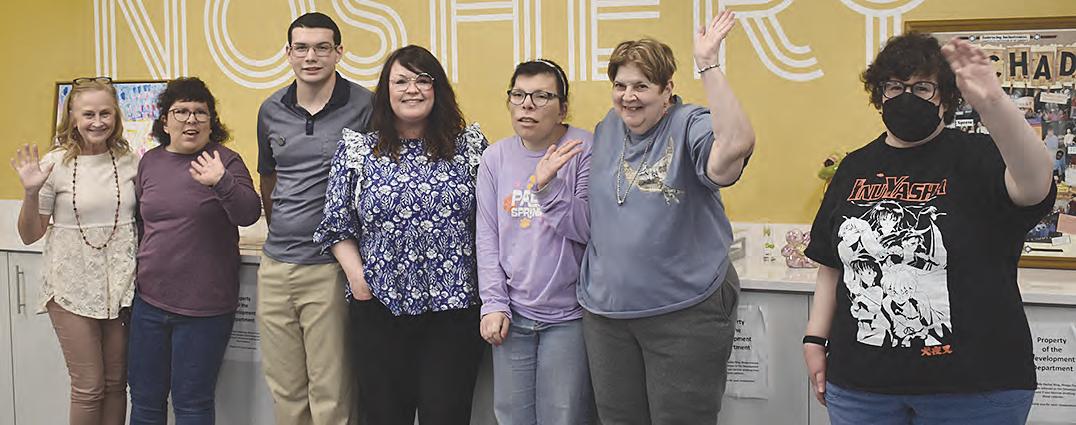
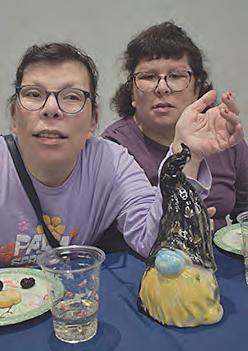

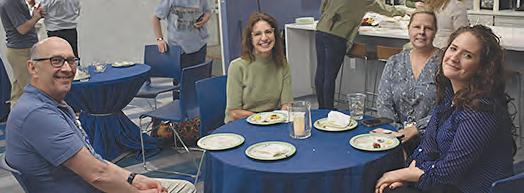

SP O TLIGHT
PHOTOS FROM RECENT JEWISH COMMUNITY EVENTS
SUBMIT A PHOTO: Have a photo of a recent Jewish Community event you would like to submit? Email the image and a suggested caption to: avandekamp@jewishomaha.org
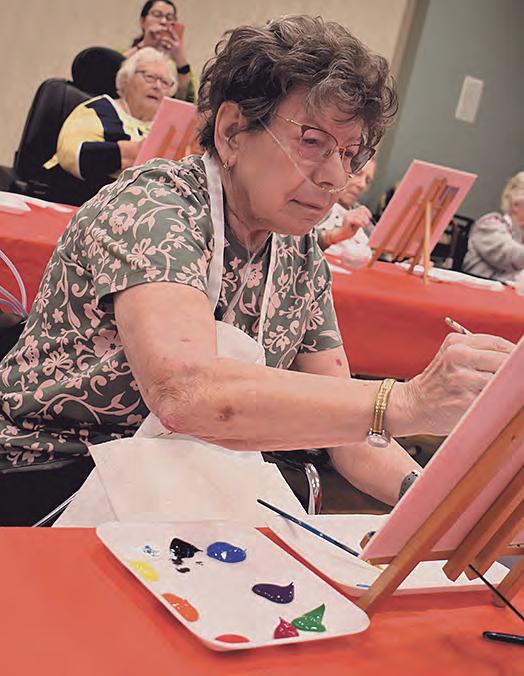

GENEROUSLY SUPPORTED BY
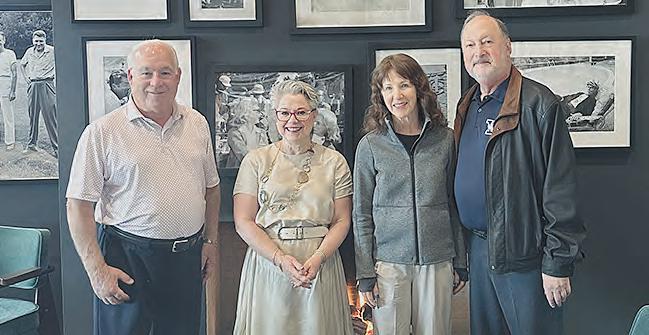
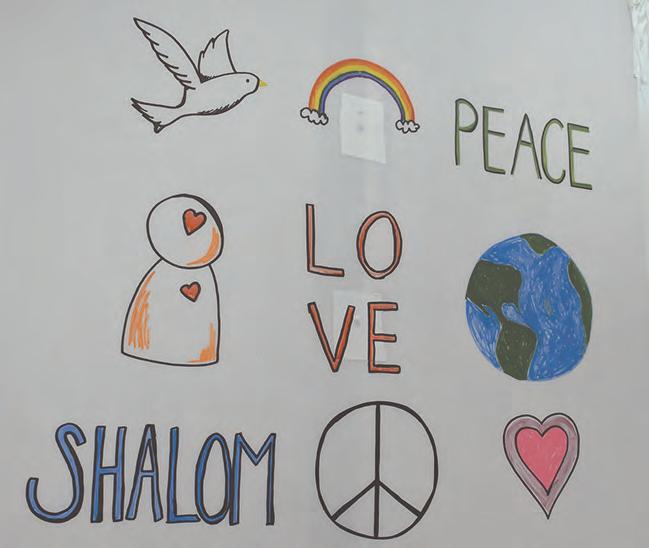
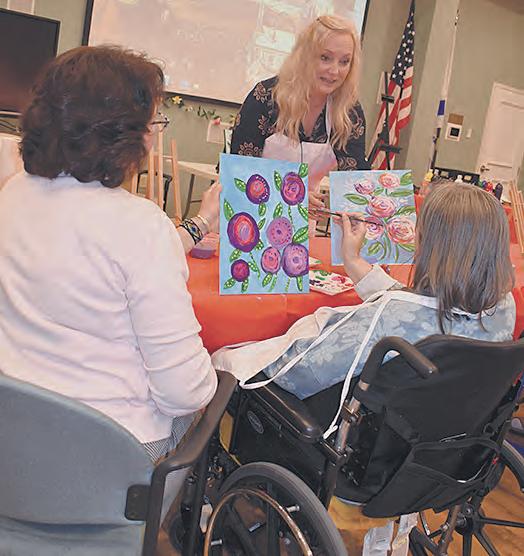
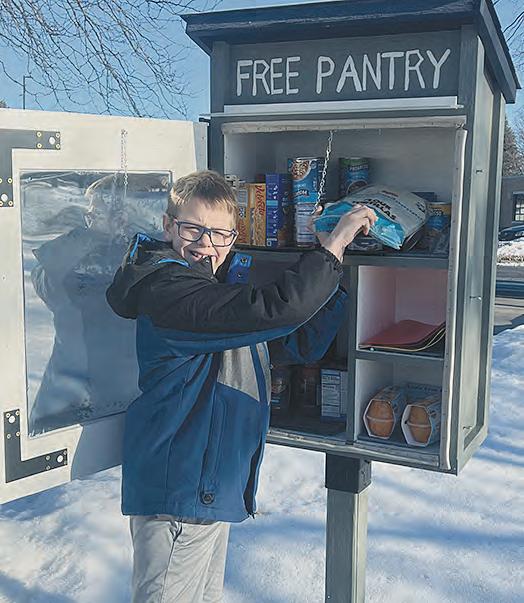


The Jewish Press | March 29, 2024 | 7
Right: Sam Kutler delivering items to the food pantry.
Above, left and below: In recognition of Jewish Disability Awareness, Acceptance, and Inclusion Month (JDAIM) in February, and National Developmental Disabilities Awareness Month in March, Yachad members created their own pieces of art to share in a traveling art exhibit. The celebration kicked off with a reception in the Noshery, with artists on hand to show off their creations.
Below: On February 22, in honor of Black History Month, the JFO Staff Diversity, Equity, Inclusion & Accessibility Committee hosted Chef Wilson from Le Voltaire. RBJH Resident Barb Ackerson is in blue, shaking Chef Wilson’s hand; Beth Brownlee is in blue pants. The other Residents might be too far away, but Jane Forney is in green, Annette Fettman in purple, Rosa Kirschenman in gray, and Doris Alloy is looking away.
Above: Breakfast in Palm Springs! Barry Kaiman, left, Rachel Ring, Carol and Alan Parsow.
Left and below: RBJH Residents had a marvelous time creating art with professional instruction from Monica Eby. It was a fun-filled morning of learning new techniques to unlock the artist within.
Above, below and bottom: What do you do with a construction wall at RBJH? You turn it into graffiti art that will inspire hope for all. Residents, staff, and students from the Friedel Jewish Academy are encouraged to share what they imagine for the world with words or symbols of hope, peace, and love. A special thanks to Erin Galvin, an RBJH artist volunteer who is so brilliant as she works on the chalkboard on Main Street, Residents' tiles, and projects like this. We are in awe of her talents.
The Jewish Press
(Founded in 1920)
Margie Gutnik
President Annette van de Kamp-Wright
Editor
Richard Busse
Creative Director
Howard Kutler
Advertising Executive
Lori Kooper-Schwarz
Assistant Editor
Gabby Blair
Staff Writer
Sam Kricsfeld
Digital support
Mary Bachteler
Accounting
Jewish Press Board
Margie Gutnik, President; Abigail Kutler, Ex-Officio; Helen Epstein; Andrea Erlich; Seth Feldman; David Finkelstein; Ally Freeman; Mary Sue Grossman; Chuck Lucoff; Suzy Sheldon; Joseph Pinson and Larry Ring.
The mission of the Jewish Federation of Omaha is to build and sustain a strong and vibrant Omaha Jewish Community and to support Jews in Israel and around the world. Agencies of the JFO are: Institute for Holocaust Education, Jewish Community Relations Council, Jewish Community Center, Jewish Social Services, Nebraska Jewish Historical Society and the Jewish Press Guidelines and highlights of the Jewish Press, including front page stories and announcements, can be found online at: www.jewishomaha.org; click on ‘Jewish Press.’ Editorials express the view of the writer and are not necessarily representative of the views of the Jewish Press Board of Directors, the Jewish Federation of Omaha Board of Directors, or the Omaha Jewish community as a whole. The Jewish Press reserves the right to edit signed letters and articles for space and content. The Jewish Press is not responsible for the Kashrut of any product or establishment.
Editorial
The Jewish Press is an agency of the Jewish Federation of Omaha. Deadline for copy, ads and photos is: Thursday, 9 a.m., eight days prior to publication. E-mail editorial material and photos to: avandekamp@jewishomaha.org ; send ads (in TIF or PDF format) to: rbusse@jewishomaha.org
Letters to the Editor Guidelines
The Jewish Press welcomes Letters to the Editor. They may be sent via regular mail to: The Jewish Press, 333 So. 132 St., Omaha, NE 68154; via fax: 1.402.334.5422 or via e-mail to the Editor at: avandekamp@jewishomaha.org.
Letters should be no longer than 250 words and must be single-spaced typed, not hand-written. Published letters should be confined to opinions and comments on articles or events.
News items should not be submitted and printed as a “Letter to the Editor.”
The Editor may edit letters for content and space restrictions. Letters may be published without giving an opposing view. Information shall be verified before printing. All letters must be signed by the writer. The Jewish Press will not publish letters that appear to be part of an organized campaign, nor letters copied from the Internet. No letters should be published from candidates running for office, but others may write on their behalf.
Letters of thanks should be confined to commending an institution for a program, project or event, rather than personally thanking paid staff, unless the writer chooses to turn the “Letter to the Editor” into a paid personal ad or a news article about the event, project or program which the professional staff supervised. For information, contact Annette van de Kamp-Wright, Jewish Press Editor, 402.334.6450.
Postal
The Jewish Press (USPS 275620) is published weekly (except for the first week of January and July) on Friday for $40 per calendar year U.S.; $80 foreign, by the Jewish Federation of Omaha. Phone: 402.334.6448; FAX: 402.334.5422.
Periodical postage paid at Omaha, NE.
POSTMASTER: Send address changes to: The Jewish Press, 333 So. 132 St., Omaha, NE 68154-2198 or email to: jpress@jewishomaha.org
The Monster of the Woods
ANNETTE VAN DE KAMP-WRIGHT Jewish Press Editor
There’s this well-worn folktale about an old Jewish man, somewhere in Russia during the 19th century, who lives alone in the forest. He is shunned by the people in town, who blame him for everything that goes wrong. When one of the villagers makes the difficult trek through the woods to visit the old man, he only does so because his father is sick and he’s heard the Jew has medicine. During his travel, we hear the villager’s thoughts, full of prejudice and antisemitic tropes. Even when faced with the old man, he maintains his way of thinking. The Jew tries to defend himself, but:
“For the first time,” the protagonist thinks to himself, “my fear is overpowered by my anger. Oh, that’s clever. Pretending that you’re the victim. I know what you are; everyone does. You’re the Monster of the Woods.”
While it’s a fable, it is (as is often the case with fables) close to the truth. We are, even in 2024, still seen as that monster in the woods. Those woods have changed—they now take the shape of spaces, in real life or online, where we exist among each other, away from antisemitic thinking. We unfriend (or are unfriended), we stop talking, trying to argue our case, because the world doesn’t want to believe us. Unlike the old man, we are not entirely isolated—we have other Jews, we have our
friends and family, our clergy, our study partnersbut we are alone nonetheless. At the end of the story, after the Jew has given the villager the medicine, the man asks him why he insists on being different. Why doesn’t he just become like everyone else? The Jew reminds him how
each other about most things) but it’s ours, and we will stick to it. Sometimes I wonder if that question the villager asks is really the one that’s simmering under the surface. It goes beyond the existence of Israel, it’s the existence of all of us everywhere that’s under threat.

the path in the woods might have been difficult, but the villager still stayed on it. Like that, he tells him, I choose to stay on my path, because I know it is the right one.
We are on the right path. It’s not always a very clear and well-defined path (we still argue with
Why don’t we give up? Why don’t we just stop being Jewish? Why don’t we assimilate completely, stop wearing our Mogen David and let go of our strange holidays and customs? Seriously, if we listen to the world right now, that seems to be the real question. We shouldn’t exist, and the world wonders why we stubbornly hold on to the Jewish path. If only we could explain to them that our Judaism is not only who we are and to what we belong; it’s where we are happy and where we find endless joy. It’s home. Being Jewish is cool, it’s fabulous, it’s amazing and wonderful and full of miracles. And whether we call ourselves reform and culturally Jewish, or modern orthodox or spiritual or chasidus or anything else on this wild and magnificent spectrum, at the end of the day, we are all Jews. We would be crazy if we gave that up.
But we are not monsters. And while the world may seem to forget that on a daily basis, it’s important that we remind ourselves often.
Like the old man, we may be in the woods, but we are on the right path.
How do we celebrate Purim in a time of mourning?
DAVID I. BERNSTEIN JERUSALEM | JTA
A colleague on the faculty of Pardes, the learning community based in Jerusalem, described to me how in her community, the annual Purim parade is quite joyous. Yet in that small town, five families have lost sons in the war that began on Oct. 7.
How can we possibly be joyous on Purim this year? How to celebrate amidst such mourning? Should the parade be canceled? Or must it go on?
There is so much to mourn: the terrible events of Oct. 7, the incomprehensible suffering of the hostages being held by Hamas, the ongoing war and the daily toll it is taking. I have not even mentioned the resurgence of antisemitism in the United States or the many other tragic events taking place around the world.
And yet, we are told to “increase our joy” in this month of Adar (this year it’s two months, due to the leap year) in anticipation of Purim, the holiday that begins this year on the evening of March 23.
Is anyone in the mood?
It is difficult — but I think Jewish tradition and Jewish history offer us some models.
Jewish tradition recognizes that there is no “full cup” of joy, nor one of unmitigated sadness. At a wedding, an occasion full of joy and hope, the groom ceremoniously breaks a glass to remind us that all is not well. Even at this moment of pure happiness, we are instructed to remember the destroyed Temple, and more generally, that we still live in a broken world.
In a similar vein, there are limitations on mourning. When the period of shiva is over, the custom is that the mourner is accompanied outside and walks around the block, signifying the need to return to the world. The laws of mourning are then eased as one moves to the 30-day period, shloshim.
This is what life is: a mixture of joy and sadness, of things we are grateful for and things we dread. Life is not black or white; rather we alternate from one to the other and back again, sometimes feeling them both at once.
In Krakow stands the oldest surviving synagogue in Poland: the Alta Shul, built in the 1400s, probably before the European discovery of America. A few centuries ago, on a different tragic Simchat Torah,
a group of Jesuit students interrupted the celebrations and took away the Torah scrolls from the Jews.
How could the community ever celebrate that holiday again? They did. But they instituted a way to remember that tragedy: for one of the hakafot — the normally joyous “parade” of the Torah scrolls — they would not sing and dance but would sit on the ground in mourning as if it were Tisha B’Av, the fast day. With the next hakafah, the singing and dancing would resume.
Fast forward to the 1970s and 1980s, as Jews all over the world struggled to help the brave Soviet Jewish activists who were trying to emigrate to Israel. My synagogue in Manhattan observed a “silent hakafah,” without song and dance, to remember The Jews of Silence (the title of Elie Wiesel’s important book about Soviet Jews trapped behind the Iron Curtain). After the silent hakafah, the celebrations resumed.
ebrations. They did not despair or wallow in selfpity. Instead, they built a future: They married, they had children, and they agitated, advocated, and fought for a Jewish State.
So we certainly don’t have the right not to move on in our lives; we need to celebrate what deserves
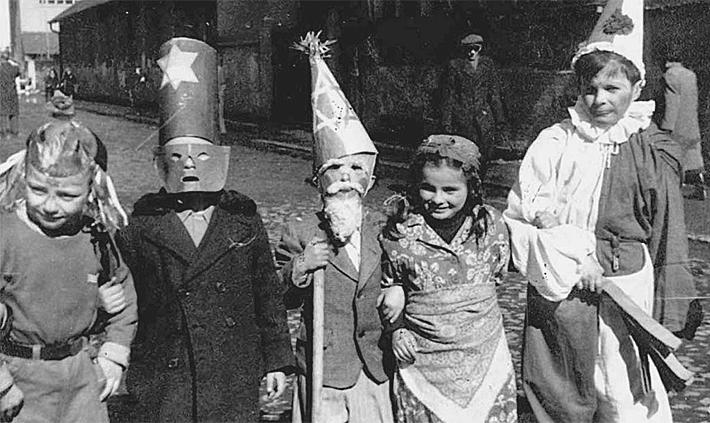
celebration.
We Jews have a very strong sense of memory. Yosef Hayim Yerushalmi, the late Columbia University historian, wrote that “remember” is written 169 times in the Hebrew Bible. We remember our slavery in Egypt, we remember the many tragedies that have befallen our people. But we do not get stuck in the past — we move on, and we celebrate life, not death.
We see this after a terrorist attack in Israel. There is a remarkable sense of solidarity, there is great sadness. Yet very quickly the blood is washed away and life at that very spot resumes.
Perhaps the best model for us is those who survived the Holocaust. The survivors of the Shoah managed to celebrate Purim in the immediate aftermath of the war, even in the Displaced Persons camps. In 1946 in Landsberg, we have photos of them in costumes; one of them even dressed up as Hitler (!), and they “hanged” him as part of their cel-
I suggested to my Pardes colleague that the parade should happen, but they should stop at each of the five homes of the fallen for a few minutes of prayer, appropriate song, and as she suggested, reciting Psalms.
In the Scroll of Esther, read on Purim, we are told “v’nahafoch hu,” that “everything flips”: the impending tragedy is averted, the persecutor is brought to justice, and sadness becomes joy.
Our Torah teaches us, “Choose life!” We must choose life to its fullest, even as we remember and mark the tragedies around us. And this year we need “v’nahafoch hu” more than ever.
David I. Bernstein is dean emeritus of Pardes. He previously directed Midreshet Lindenbaum for 12 years and was a Jerusalem Fellow at the Mandel School for Jewish Education. He leads immersive Jewish heritage trips to Poland, Germany, Prague, Vienna, and Budapest.
The views and opinions expressed in this article are those of the author and do not necessarily reflect the views of JTA or its parent company, 70 Faces Media.
Nebraska Press Association Award winner 2008 American Jewish Press Association Award Winner National Newspaper Association 8 | The Jewish Press | March 29, 2024 Voices
express the view of the writer and are not necessarily representative of the views of the Jewish Press Board of Directors, the Jewish Federation of Omaha Board of Directors, or the Omaha Jewish community as a whole.
Editorials
Children in costume for the Purim holiday at the Landsberg DP camp, Germany, after World War II. Credit: Yad Vashem Photo Archive
Credit: Credit: Christine Johnstone, licensed under the Creative Commons Attribution-Share Alike 2.0 Generic license.
Israel’s Black Panthers radicalized Mizrahi Jews, and changed the country
ANDREW SILOW-CARROLL
JTA
In Jerusalem’s rapidly gentrifying Musrara neighborhood, there’s a street sign reading “Black Panthers Way.”
Puzzled Americans may wonder why Israelis have paid tribute to the radical African-American group that terrified the establishment in the 1960s, but local residents know better: The sign is an homage to the Israeli Black Panthers, a group of Mizrahi youth who borrowed the name and some of the tactics of the American group to demand an end to the discrimination faced by Israeli Jews with roots in the Middle East and North Africa.
In the early 1970s, the Black Panthers held street demonstrations and staged Robin Hood-like protests. They provoked the Israeli government (Prime Minister Golda Meir famously called them “not nice”) and brought attention to the dire conditions in places like Musrara, a formerly Arab Christian neighborhood of Jerusalem that served as a sort of dumping ground for the Mizrahi immigrants who flooded into the country in the 1950s.
The Panthers also managed to create what the scholar of Mizrahi Jewry, Sami Chetrit, calls a “mass workshop for rehabilitating an oppressed identity.”
Chetrit is quoted in Israel’s Black Panthers: The Radicals Who Punctured a Nation’s Founding Myth, by my JTA colleague Asaf Elia-Shalev. The new book is a history of the Israeli Panthers and the social revolution they brought about. It is told through the recollections of its still-living veterans, such as the Moroccan-born activist Reuven Abergel, archives in Israel and the United States, and a cache of classified police intelligence files on the Panthers.
Perhaps, with war in Gaza and anti-Israel protests being staged around the world, following a year of deep divisions within Israeli society itself, there might not be much of an appetite in Israel or among American Jews for a book that explores Israel’s sometimes shameful treatment of its Mizrahi underclass. But Elia-Shalev, 36, sees a degree of hope in the way the Panthers helped change a fractured country for the better.
“I think ultimately the lesson of the Panthers is that a very small group of people that you never expected anything from could change society,” he told me.
Elia-Shalev is a staff reporter for JTA. He is an Israeli-American who lived in Israel for six years as a child and has since lived and worked there for what he calls “a third of my life.” He currently lives in Los Angeles.
Our interview was edited for length and clarity.
Yours is the first book-length treatment, at least in English, of the Israeli Black Panthers. Why didn’t Israeli historians or journalists think they were worth a deeper look?
There are a few reasons. One is that Israeli academia has a blind spot around the history of Mizrahim. The other reason is that Israeli academics have been more interested in theory, and like arguing about the right theoretical framework to think about the Panthers rather than the people who have never been interviewed.
Did your own background draw you to the story?
I’m Mizrahi on my dad’s side, who is an Iraqi Jew, and on my mom’s side we’re Sephardic Bulgarians. At UC Berkeley, my biggest paper in college was about the American Black Panthers and their impact on the student activism of the day on campus. I stumbled upon a reference to the Israeli Black Panthers, and that they represented the struggle of the Mizrahi Jews, and I was like, “Oh, wait, I think that’s me.” I didn’t have a strong sense of my own heritage at the time, and, wanting to know more, I just was incredibly frustrated that there was almost no material.
You enter the story largely through the biography of Reuven Abergel, who was one of the early activists in what became the Panthers. Tell me who he is, how you connected with him and what he represents about the history of this movement.
I started sitting down with Reuven Abergel maybe 10 years ago, before I knew there would be a book. After college, I worked in the Bay Area for a little bit, then I moved to Israel to work for Haaretz as a news editor. Within a month of moving to Israel, I went to some party and I met Reuven. And immediately we had a connection. He really wanted to tell his story in English. At that time he was giving weekly tours about the Black Panthers in Musrara, where he grew up incredibly poor, and I would translate. It was a really interesting exercise, having him speak through me. I had to be so attuned to what he’s saying because he speaks in philosophical ways and he meanders and he’s very intellectual. And he was saying things that were quite shocking to me about Israel’s treatment of Mizrahim.
The Panthers emerge in the early 1970s. What was the situation facing Mizrahi Jews, who were on the way to becoming a majority in Israel?
Israel had just emerged from the 1967 war. And there’s this economic boom happening in the country, kind of leaving behind the old Israel of the kibbutz and austerity and opening up to the world. There’s visible wealth everywhere, at least on an Israeli scale. Mizrahim were largely left out of that economic progress and still living in the same way they’d been living the 1950s, sometimes 10 people to a room in unsanitary
conditions, with little or no positive contact with any state institutions, whether it’s school or social workers. Police were very present in Musrara and would regularly beat up children and teenagers. And there are thousands of street youth, street gangs, young Mizrahi men in their teens or in their early 20s who just hang out and get into trouble and have no prospects. Something has to happen with that energy.
But what about the army? Weren’t they part of the universal draft?
The military, until that point, would disqualify anyone who had any kind of criminal record. And that’s important because the military was a vehicle of social mobility.
What becomes the impetus for an actual organization?
It’s a little bit mysterious. There’s a lot of people who take credit. Again, after 1967, Jerusalem became this mecca for hippies. Until then, none of the student protests or civil rights activity were happening in Israel and then after ‘67 it comes rushing in. You have these American radicals who start to
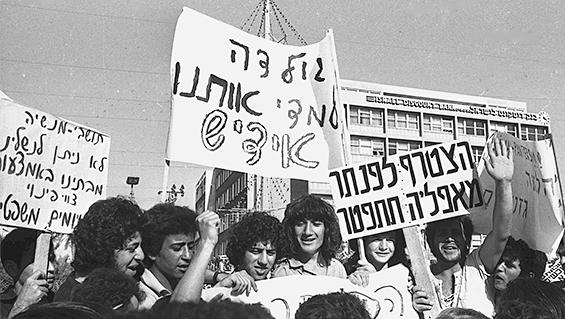
meet the group that would become the Panthers and start to talk to them about their problems and revolutionaries like the Tupamaros in Venezuela and the Red Army Faction in Germany and the American Black Panthers.
Meanwhile, there’s this pioneering group of social workers in Musrara saying, “We need to organize the poor to demand systemic change.” They were influenced by people like the American-Jewish organizer Saul Alinsky, who wrote “Rules for Radicals,” and other kinds of things that were happening in the United States. They wanted more money for their departments, more money for social welfare. And they were very savvy about using the media to put pressure on politicians and started to feed stories about abject poverty in the slums of Jerusalem and Tel Aviv. They started to teach Panthers how to read and write because many of them had never learned. The youth start reading about all the student activism happening all over the world. And so young Mizrahim like Charlie Biton and Saadia Marciano talked about what they wanted, that they should be like the Black Panthers.
And soon this nascent movement came to the attention of the government.
The press loved it. The politicians at first denied that it existed but then started to freak out. Police immediately started putting detectives on this group even though they hadn’t done anything. There were informants and high-level police meetings and the organizers realize, “In that case, we should do a protest. We want the government to pay attention to us.”
That’s how your book opens, with Prime Minister Golda Meir’s cabinet freaking out about what a protest in Musrara could end up sparking.
At an emergency meeting, Golda and her advisors discuss what they should do. They thought it would turn violent because they consider these people to be low-life scum who weren’t capable of doing anything but be violent. They also have a memory of 1959 when a police officer was shot in Wadi Salib, a Mizrahi neighborhood in Haifa, and there was a big uprising that lasted for months. Golda, as an American, is also attuned to what’s happening in the United States with the rise of black militancy.
Until then, Israel had been able to fend off the radical energies that were taking over the streets all over Europe and the US.
What is the result of the emergency meeting?
She authorized the police to arrest 15 people under what today is called administrative detention, where you don’t need to bring actual charges. This was in the emergency code enacted by the British and was the first time that it was applied by Israel to Jews as far as I can tell.
And of course, it backfired. Anyone with any kind of liberal leaning in Israel was asking, “Why are you arresting people?” Word gets out very quickly that raids are happening. And then every bohemian, every left-winger, every kind of professor, all these respectable people descend on City Hall to join the protest. And then they marched over to the police station where some of the Panthers are being held and demand their release. And that taught the Panthers a lesson that what they were doing was very provocative and very threatening. And they knew that they were onto something.
The height of their influence is from 1971 until the Yom Kippur War in 1973. What did they accomplish in that short time?
Their peak dates from that very first protest, March 3, 1971, which was followed by a rapid succession over the next six months of gradually escalating protests, with thousands of people in the streets. A month after arresting them, Meir meets with them in her office to hear their demands. There is a frenzy of articles about them in every newspaper. They force Israel to contend with this domestic problem.
The War of Attrition with Egypt had just ended in 1970, so there was this unprecedented quiet on Israel’s borders after 1970 and until the 1973 war. So they get everyone talking about the problem of poverty and very quickly the government starts releasing funding at every level, from education to housing to employment. The Knesset starts passing legislation. In 1972, the year after the Panthers launched, it passed what’s been dubbed the “budget of the Panthers” — a massive expenditure on social welfare. It was the first time in Israeli history that the country was spending more on domestic issues, on social welfare, than on military and defense.
They also reform the way criminal justice is conducted. Minors are no longer put through the same process as adults.
While most politicians didn’t want to give credit to the Panthers for all these changes, as a result of the Panthers we see the creation in Israel for the first time of a modern welfare state modeled after European social democracy. And, of course, that doesn’t necessarily last. Whether it’s the 1973 war or the economic recession that followed, you see the rise of the right-wing Likud, which had no interest in turning Israel into a European social democracy.
While the Panthers were so rooted in the radical politics of the left, the Mizrahi community as a whole takes a turn to the right, proving key to the election of Menachem Begin’s Likud party in 1977 after 30 years of left-wing rule by Labor. What accounts for that?
It’s important for me to clarify that for every kind of peace movement, Mizrahim were there. They were represented on the left. Charlie Biton, for example, was the first prominent Israeli to meet with PLO leader Yasser Arafat.
I’m always careful about this conversation because there’s a sense that Mizrahim are stubbornly anti-peace or stubbornly anti-Arab. But I think they’ve always been the constituency that’s been perhaps the most flexible over time — for example, when Shas, the religious Mizrahi party, voted to abstain rather than oppose the Oslo Accords between Israel and Arafat’s PLO.
If you look at the far right, the settlement movement, it’s always been led by Ashkenazim. The Likud was always led by Ashkenazim, and Mizrahi moderates like David Levy were passed over.
There is also a lot of religious flexibility. Mizrahi are what’s called masorti, or traditional — ostensibly Orthodox but with a lot of built-in flexibility. They will make allowances for things in a way that the extremist settlers and extreme religious right, who have come to dominate politics in Israel, do not.
But you’re right, the Panthers went one direction, and the Mizrahi public by and large went in a different direction.
You write that the Likud represented the outsiders at a time when the Ashkenazim dominated the establishment.
That’s a big part of the alliance. The Panthers talked a big game about being very radical and being against the establishment, but unlike the Black Panthers in the United States, they weren’t separatists. They believed in the Jewish state and they felt betrayed that they were relegated to second-class status.
Enter Menachem Begin and the Likud, who had their own history of marginalization, and were cut out of centers of power for many years and just maligned in different ways.
Begin had a lot of credibility as a founding father, and he had a lot of charisma, and he looked at the grievance of the Mizrahi public and channeled it. In a famous speech he calls them the real Zionists, warriors and his brothers. The Mizrahim in turn saw an opportunity to register their discontent. And so this alliance was forged between these two disgruntled groups. And Likud has kind of been ruling the country ever since, except for pauses here and there.
After their heyday, some of the Panthers took very different paths. Abergel fell on some hard times, and Biton and Marciano made it into the Knesset.
Marciano very briefly makes it into the Knesset, and he did different kinds of activism until he died at age 58.
Charlie Biton joins the communists and they create the Hadash party. He’s in Knesset for 15 years and continues to champion Mizrahi causes. They couldn’t dismiss him as the crazy radical communist because he represented something real, something widespread and something not marginal to the conversation.
Andrew Silow-Carroll is editor at large of the New York Jewish Week and managing editor for Ideas for the Jewish Telegraphic Agency.
This article was edited for length. Read more at www. omahajewishpress.com
The Jewish Press | March 29, 2024 | 9
Black Panthers protest in Tel Aviv, May 3, 1971. The sign at top reads, “Golda, teach us Yiddish,” accusing the prime minister, Golda Meir, of favoring Jews from Ashkenazi, Yiddish-speaking backgrounds. Credit: Israel Sun Ltd., from the Judaica Collection of the Harvard Library, Harvard University
B’NAI ISRAEL SYNAGOGUE
618 Mynster Street
Synagogues
Council Bluffs, IA 51503-0766
712.322.4705 www.cblhs.org
BETH EL SYNAGOGUE
Member of United Synagogues of Conservative Judaism 14506 California Street Omaha, NE 68154-1980
402.492.8550
bethel-omaha.org
BETH ISRAEL SYNAGOGUE
Member of Union of Orthodox Jewish Congregations of America 12604 Pacific Street Omaha, NE. 68154
402.556.6288
BethIsrael@OrthodoxOmaha.org
CHABAD HOUSE
An Affiliate of Chabad-Lubavitch 1866 South 120 Street Omaha, NE 68144-1646
402.330.1800
OChabad.com
email: chabad@aol.com
LINCOLN JEWISH COMMUNITY: B’NAI JESHURUN
South Street Temple Union for Reform Judaism
2061 South 20th Street Lincoln, NE 68502-2797
402.435.8004
www.southstreettemple.org
OFFUTT AIR FORCE BASE
Capehart Chapel 2500 Capehart Road Offutt AFB, NE 68123 402.294.6244
email: oafbjsll@icloud.com
ROSE BLUMKIN JEWISH HOME
323 South 132 Street Omaha, NE 68154
TEMPLE ISRAEL
Union for Reform Judaism (URJ)
13111 Sterling Ridge Drive Omaha, NE 68144-1206 402.556.6536 templeisraelomaha.com
LINCOLN JEWISH COMMUNITY:
TIFERETH ISRAEL
Member of United Synagogue of Conservative Judaism
3219 Sheridan Boulevard Lincoln, NE 68502-5236
402.423.8569 tiferethisraellincoln.org
B’NAI ISRAEL
Monthly Speaker Series Service, Friday, April 12, 7:30 p.m. with our guest speaker, Scott Littky. Our service leader is Larry Blass. Everyone is always welcome at B’nai Israel!
For information about our historic synagogue, please visit our website at www.cblhs.org or contact any of our other board members: Renee Corcoran, Scott Friedman, Rick Katelman, Janie Kulakofsky, Howard Kutler, Carole and Wayne Lainof, Ann Moshman, Mary-Beth Muskin, Debbie Salomon and Sissy Silber.
Handicap Accessible.
BETH EL
Services conducted by Rabbi Steven Abraham and Hazzan Michael Krausman.
IN-PERSON AND ZOOM MINYAN SCHEDULE: Mornings on Sundays, 9:30 a.m.; Mondays and Thursdays 7 a.m.; Evenings on Sunday-Thursday 5:30 p.m.
FRIDAY: Kabbalat Shabbat 6 p.m.
SATURDAY: Shabbat Morning Service, 10 a.m. at Beth El & Live Stream; Jr. Congregation (Grades K-12), 10 a.m.; Kiddush Lunch sponsored by Janie Kulakofsky following services; Havdalah, 8:25 p.m. Zoom
Only.
SUNDAY: BESTT (Grades K-7), 9:30 a.m.; Hebrew Reading for Adults, 10:30 a.m. with Hazzan Krausman; Adult B’nai Mitzvah, 11:15 a.m. with Hazzan Krausman; Dinner at the Stephen Center, 5 p.m.
WEDNESDAY: BESTT (Grades 3-7), 4:15 p.m.; Hebrew High (Grades 8-12), 6 p.m.
FRIDAY-Apr. 5: Kabbalat Shabbat, 6 p.m.; Pre-Neg & Tot Shabbat, 5:30 p.m.; Our Shabbat Tables, 7 p.m. at Beth El.
SATURDAY-Apr. 6: Shabbat Morning Service 10 a.m. at Beth El & Live Stream; Jr. Congregation (Grades K-12), 10 a.m.; Havdalah, 8:30 p.m. Zoom Only. Please visit bethel-omaha.org for additional information and service links.
BETH ISRAEL
FRIDAY: Nach Yomi, 6:45 a.m.; Shacharit, 7 a.m.; Candlelighting/Mincha/Kabbalat Shabbat, 7:29 p.m.
SATURDAY: Shabbat Kollel, 8:30 a.m.; Shacharit 9 a.m.; Tot Shabbat, 10:30 a.m.; Youth Class, 10:45 a.m.; Kids Kiddush Club, 11:15 a.m.; Soulful Torah: Unpacking the Or HaChayim’s Teachings, 6:25 p.m.; Mincha/Ma’ariv, 7:20 p.m.; Laws of Shabbos/Kids Activity 7:50 p.m.; Havdalah, 8:30 p.m.
SUNDAY: Shacharit 9 a.m.; Kinyan HaMasechta, 9:40 a.m.; Mincha/Ma’ariv, 7:30 p.m.
MONDAY: Nach Yomi, 6:45 a.m.; Shacharit, 7 a.m.; Monday Mind Builders, 4 p.m.; Mincha/Ma’ariv, 7:30 p.m.
TUESDAY: Nach Yomi, 6:45 a.m.; Shacharit, 7 a.m.; Kinyan HaMasechta before Mincha/Ma’ariv; Mincha/ Ma’ariv, 7:30 p.m.
WEDNESDAY: Nach Yomi, 6:45 a.m.; Shacharit, 7 a.m.; Mincha/Ma’ariv, 7:30 p.m.
THURSDAY: Nach Yomi, 6:45 a.m.; Shacharit, 7
a.m.; Character Development Class, 9:30 a.m.; Kinyan HaMasechta before Mincha/Ma’ariv.; Mincha/Ma’ariv, 7:30 p.m.; Parsha Class, 8 p.m.; FRIDAY-Apr. 5: Nach Yomi, 6:45 a.m.; Shacharit, 7 a.m.; Candlelighting/Mincha/Kabbalat Shabbat, 7:37 p.m.
SATURDAY-Apr. 6: Shabbat Kollel, 8:30 a.m.; Shacharit, 9 a.m.; Tot Shabbat, 10:30 a.m.; Youth Class 10:45 a.m.; Kids Kiddush Club, 11:15 a.m.; Soulful Torah: Unpacking the Or HaChayim’s Teachings, 6:45 p.m.; Mincha, 7:30 p.m.; Laws of Shabbos/Kids Activity 8 p.m.; Havdalah, 8:38 p.m.
Please visit orthodoxomaha.org for additional information and Zoom service links.
CHABAD HOUSE
All services are in-person. All classes are being offered in-person and via Zoom (ochabad.com/academy). For more information or to request help, please visit www.ochabad.com or call the office at 402.330.1800.
FRIDAY: Shacharit 8 a.m.; Inspirational Lechayim, 5:45 p.m. with Rabbi and friends: Ochabad.com/ Lechayim; Candlelighting, 7:28 p.m.
SATURDAY: Shacharit, 9:30 a.m. followed by Kiddush and Cholent; Shabbat Ends, 8:29 p.m.
SUNDAY: Sunday Morning Wraps: Shacharit, 99:30 a.m., Video Presentation, 9:30 a.m. and Breakfast, 9:45 a.m.; Torah and Tea, 1030-11:15 a.m. Third Series begins.
MONDAY: Shacharit, 8 a.m.; Personal Parsha, 9:30 a.m.; Intermediate Biblical Hebrew Grammar, 10:30 a.m. with Prof. David Cohen; Parsha Reading, 6 p.m. with Prof. David Cohen.
TUESDAY: Shacharit 8 a.m.; Intermediate Biblical Hebrew Grammar, 6 p.m. with Prof. David Cohen; Introductory Biblical Hebrew Grammar, 7 p.m. with Prof. David Cohen.
WEDNESDAY: Shacharit, 8 a.m.; Mystical Thinking (Tanya), 9:30 a.m.; Introductory Biblical Hebrew Grammar, 10:30 a.m. with Prof. David Cohen; Parsha Reading, 11:30 a.m. with Prof. David Cohen.
THURSDAY: Shacharit 8 a.m.; Introduction to Alphabet, Vowels & Reading Hebrew, 10 a.m. with Prof. David Cohen; Advanced Biblical Hebrew Grammar, 11 a.m. with Prof. David Cohen; Talmud Study (Sanhedrin 34), noon; Introduction to Alphabet, Vowels & Reading Hebrew, 6 p.m. with Prof. David Cohen; Kitzur Shulchan Aruch (Code of Jewish Law) Class, 7 p.m.
FRIDAY-Apr. 5: Shacharit 8 a.m.; Inspirational Lechayim, 5:45 p.m. with Rabbi and friends: Ochaba d.com/Lechayim; Candlelighting, 7:36 p.m.
SATURDAY-Apr. 6: Shacharit 9:30 a.m. followed by Kiddush and Cholent; Shabbat Ends, 8:37 p.m.
LINCOLN JEWISH COMMUNITY: B’NAI JESHURUN & TIFERETH ISRAEL
Services facilitated by Rabbi Alex Felch. All services offered in-person with live-stream or teleconferencing options.
FRIDAY: Erev Shabbat Service with Rabbi Alex,
6:30 p.m. at SST; Shabbat Candlelighting, 7:31 p.m.
SATURDAY: Shabbat Morning Service, 9:30 a.m. at TI; LJCS Jr. Congregation, 11:30 a.m. followed by a small luncheon at TI; Torah Study noon on Parashat Tzav; Havdalah, 8:31 p.m.
SUNDAY: No In-Person LJCS Classes (Home Activities); Men’s Bike/Coffee Group, 10:30 a.m. in the Conference Room at Rock 'n Joe (5025 Lindbergh St.). For more information or questions please email Al Weiss at albertw801@gmail.com; Pickleball, 3-5 p.m. Anyone interested in playing or learning how to play can text Miriam at 402.470.2393. If there are enough interested people; we will play in the Social Hall at TI.
WEDNESDAY: LJCS Hebrew School, 4:30-6 p.m.; Jewish Themes Through Jewish Films: Nora's Will, 6:30 p.m. at SST.
FRIDAY-Apr. 5: Erev Shabbat Service with Rabbi Alex, 6:30 p.m. at SST; Shabbat Candlelighting, 7:38 p.m.
SATURDAY-Apr. 6: Shabbat Morning Service, 9:30 a.m. at TI; Torah Study noon on Parashat Shemini; Havdalah, 8:39 p.m.; Post Purim Spiel, 7 p.m. at SST.
OFFUTT AIR FORCE BASE
FRIDAYS: Virtual Shabbat Service, 7:30 p.m. every first and third of the month at Capehart Chapel. Contact TSgt Jason Rife at OAFBJSLL@icloud.com for more information.
ROSE BLUMKIN JEWISH HOME
The Rose Blumkin Jewish Home’s service is currently closed to visitors.
TEMPLE ISRAEL
In-person and virtual services conducted by Rabbi Benjamin Sharff, Rabbi Deana Sussman Berezin, and Cantor Joanna Alexander
FRIDAY: Drop in Mah Jongg, 9-11 a.m. In-Person; Shabbat B’yachad Service, 6 p.m. In-Person & Zoom.
SATURDAY: Torah Study 9:15 a.m. In-Person & Zoom; Shabbat Morning Service, 10:30 a.m. In-Person & Zoom.
SUNDAY: No Youth Learning.
WEDNESDAY: No Youth Learning; Yarn It, 9-11 a.m. In-Person.
THURSDAY: Thursday Morning Class, 11 a.m. with Rabbi Sharff and Rabbi Azriel In-Person & Zoom. FRIDAY-Apr. 5: Drop in Mah Jongg, 9-11 a.m. InPerson; Shabbat Shira Service, 6 p.m. In-Person & Zoom.
SATURDAY-Mar. 30: Torah Study 9:15 a.m. In-Person & Zoom; Shabbat Morning Service, 10:30 a.m. InPerson & Zoom; Israeli Humor: It’s Ok to Laugh with Benji Lovitt, 7:30 p.m. RSVP Required. Please visit templeisraelomaha.com for additional information and Zoom service links.
Why will this year’s seder be different from all the other seders of your life?
SHANI KATZMAN
Chabad Center Education Director
As the buds of spring unfurl, heralding the arrival of Passover, Jewish families everywhere prepare to welcome Pesach and its 3300-year-old, yet ever relevant and timely story, of Redemption. It’s the story that would serve us well every day, if we could tap into its essence.
If you find your seders getting stale or stagnant and you wonder what Passover has to do with the spring, anyway, you are not alone. If you find yourself plagued (pun intended!) by a desire to make Passover special for yourself and your family, you are in good company. If you are looking for insights and ideas from generations past on how to execute a wonderful seder without the overwhelm, keep reading.
Do you find yourself asking, “How should I set the table?” or “Can someone give me a Passover seder shopping list?” or “Can we simplify this?”
“What are the most important elements?” or even, “How can I
get something out of the seder if I’m so busy worrying about everyone else?”
This year you can create a seder for you, your family and friends that will be meaningful, interesting, doable, and gratifying. Learn how to pull off your dream Seder with the “Taste of Passover” event scheduled for April 9 from 7 to 8:30 p.m. at Chabad.
Whether your style is formal or fun, this gathering for women will offer learning, tablescape ideas, recipes, and tips to infuse the traditional Seder with freshness and personal meaning. There will be recipe samplings and refreshments will be served. Also, with your reservation, you can send questions ahead of time that will be addressed during the program.
Many women don’t feel equipped to create an energizing, entertaining, and compelling event for their families. Our goal at Chabad is to empower women with knowledge, inspiration, and practical tips for making the Seder the special event it is meant to be.
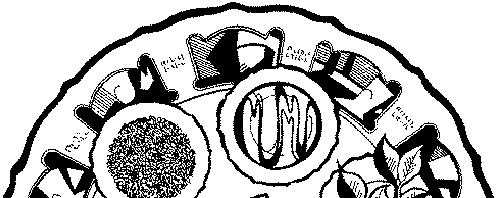
One that resonates with everyone who
gathers around our table.
In a world that feels increasingly fragmented, the timeless messages of Jewish pride, connection, and joy become our anchors. Taste of Passover is committed to bringing these messages alive for its participants.
When our people were in Egypt, the Jewish women of the day led, inspired, and nurtured their families and made them proud Jews. Throughout the generations it was the women who bolstered the morale of our people during difficult times. Today those women are us.
Now, more than ever, the messages of Jewish pride, connection, and joy are vital. They are not themes to be revisited only during Passover but gifts to live with every day. Come learn how to make them your own, how to pass them on to your family.
As we prepare to embrace another Passover season, we can reinforce these values in our families, illuminating the path toward a future where these values shine brighter than ever.
Cost for the event is $18. Please reserve at ocha bad.com/tastepassover
10 | The Jewish Press | March 29, 2024
JEWISH PRESS NOTICE The Jewish Press will be closed on Tuesday, April 23 for Passover. Questions? Call 402.334.6448.
A different Purim
PHILISSA CRAMER
JTA
In Jerusalem, a service omitted the loud noise-making associated with the holiday in order to accommodate soldiers traumatized by months of war. In Tel Aviv, bakeries peddled a triangular treat renamed for the leader of Hamas. And in Jewish communities around the world, costumes and holiday gifts paid homage to the more than 130 Israeli captives who remain in Gaza.
Those adjustments marked some of the many ways that Purim, a generally whimsical Jewish holiday that celebrates an ancient victory over a threatened genocide, took a different shape this year because of ongoing war and hostage crisis.
up as Batman in honor of the Bibas family. And Melinda Strauss, an Orthodox influencer in the New York City area, posted pictures of mishloach manot, the traditional food gifts given on the holiday, that came with names of hostages to keep in mind; she herself had made a maple cake beloved by a mother murdered on Oct. 7 to give to her own friends.
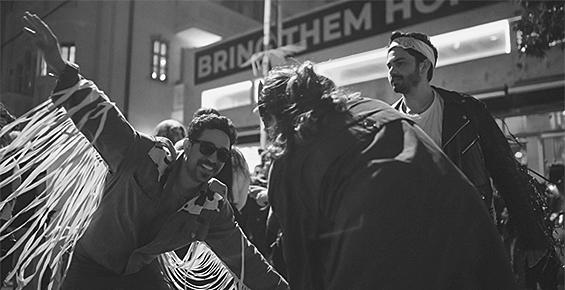
Many communities went ahead with the merrymaking expected of the holiday, with synagogues holding Purim carnivals for children and parties for adults. Spiels drew from a wide range of of-the-moment themes, including Barbie and Taylor Swift. In Israel, the streets filled as usual with costumed children.
But there were signs that it was not a typical Purim, starting with the hamantaschen sold in Israel this year. The Hebrew name for the cookies is “Oznei Haman” or Haman’s ears, named for the villain in the Purim story. This year, some bakeries renamed them “Oznei Sinwar,” a reference to Yahya Sinwar, the (notably large-eared) Hamas leader credited with masterminding the Oct. 7 attack on Israel that triggered the current war.
The war made itself felt in other ways. Some wrestled with how to celebrate at a time of such sadness. Some grappled with the contemporary implications of a chapter of the Purim story that suggests that the Jews, once saved in ancient Persia, exacted steep revenge. And some incorporated the war into their Purim costumes and practices.
After a returned soldier posted on the local Facebook group Secret Jerusalem that he was looking for a subdued Purim service — ”Enough time in battle and I just need a quiet one” — Chabad of Rehavia added a noise-free service to its plans. Because of a verse in the Scroll of Esther about “walled cities,” Purim is celebrated a day later in Jerusalem than in the rest of the world; the city went ahead Monday with its first official Purim Parade for the first time in more than four decades, though its attendance was reportedly lower than expected.
In posts on social media displaying Purim costumes, an unusual number of soldiers could be spotted among the pirates, Queen Esthers and astronauts in children’s parades. Rachel Edri, who became famous after offering cookies to her Hamas captors in October, shared pictures of a number of people of all ages who had dressed as her.
Others aimed to use the holiday to galvanize support for releasing the hostages. Many people posted pictures on social media of Kfir and Ariel Bibas, the young brothers who are the only children who remain in Gaza, in their Batman costumes from last year; a rally in New York City saw participants dress
LETTER TO THE EDITOR
Dear Editor,
Note: Response to the 3-15-2024 Letter to the Editor.
The letter stated that Nebraska’s only Jewish newspaper should not be advertising such an event as “Bob, The Drag Queen” as a part of the Inclusive Communities conversation which is part of the Rabbi Brooks Conversation for Change series. Furthermore, it stated that this issue of The Press should not be seen by children. I do not understand why anyone fears this.
The letter further says that Rabbi Brooks’ passion for teaching “the truth as he found it in the Torah” would prohibit this event. The letter also quotes Deuteronomy saying that men should not wear women’s clothing. This letter does a disservice to everything that Rabbi Brooks stood for and supported.
Leviticus says “To not shave your beard.” Leviticus also says “Not to tattoo your body.” The Jewish Press has printed many pictures of men clean-shaven. I would guess that others pictured in The Press may have tattoos.
If Jewish Family Service holds a seminar to address the needs of our LGBTQIA community, is that also something that should not be in The Press, as the Bible says that man should not lay with man?
My husband has concerns about me sending this letter. I have no such concerns.
SUSIE SILVERMAN
Some attendees wore costumes to the weekly Saturday night rally in Tel Aviv to raise attention to the hostages. One woman turned the iconic hostage poster into a costume for herself, aiming to extend the posters’ effort to raise awareness about the remaining captives at a time when Israel is negotiating for the release of more of them. During the holiday, the news leaked that Israel has offered to release 800 prisoners to secure the safety of 40 hostages during a potential ceasefire. Officials reportedly believe the odds of an eventual deal are just even.
Despite the adjustments to the holiday, the celebrations elicited tensions from those whose grief remains raw.
“I’m not doing Purim this year. That’s it. I am not moving on. It feels too cruel,” Elana Sztokman, an Israeli anthropologist, educator and activist, wrote in her Substack newsletter. She said the holiday had made her even more conscious of the fact that Israel’s leadership has not acted as aggressively as she and many others would like to secure the hostages’ release.
“Does Jewish peoplehood even exist if some people are kind of expendable? Sacrificable? Or are peoplehood and community just fictions we keep telling ourselves? So that we can have fun moments like Purim parties?”
While one family member of a current hostage read psalms at a Purim service, others wrestled openly with how much to take part in the holiday.
“Every [Instagram] story of mine is of parties, of people who are happy and celebrating life. On the one hand deserves to celebrate life and be happy,” Maya Regev, who was held hostage until November, said in a statement posted to the social media account dedicated to her best friend Omer ShemTov, who remains in captivity. “On the other hand, I’m angry. I’m angry when I think of Omer and how much he would have loved to be here celebrating with us.”





ANNOUNCEMENT
CLASSIFIED ADVERTISING in over 150 newspapers. Reach thousands of readers for $225/25 word ad. Contact the Jewish Press or call 1-800-369-2850.
HELLO NEBRASKA! Introducing www.nepublicnotices.com, a new public notice website presented as a public service by all Nebraska newspapers. Free access, fully searchable – because democracy depends upon open government and your right to know.
AFFORDABLE PRESS Release service. Send your message to 155 newspapers across Nebraska for one low price! Call 1-800369-2850 or www.nebpress.com for more details.
BUSINESS FOR SALE
CENTRAL NEBRASKA Wholesale Popcorn/Kettle Corn Manufacturing and Snack Distribution Business serving Nebraska, South Dakota, Kansas and Wyoming. Inquire at kettlecornsnacks2016@gmail.com.
FOR SALE - AGRICULTURE
MERIDIAN SEED Tenders Models 225 and 240 on hand. Replacement parts including auger flighting, conveyor belting, electric auger tip up kits. TAG Sales and Service. 1-402-560-8508 hellerichgary@gmail.com.
FOR SALE - SENIORS
STROKE AND Cardiovascular disease are leading causes of death, according to the American Heart Association. Screenings can provide peace of mind or early detection! Contact Life Line Screening to schedule your screening. Special offer - 5 screenings for just $149. Call 1-844-893-8016.
PORTABLE OXYGEN Concentrator? May be covered by Medicare! Reclaim independence and mobility with the compact design and long-lasting battery of Inogen One. Free information kit! Call 855-385-3580.
HOME SERVICES
DOES YOUR basement or crawl space need some attention? Call Thrasher Foundation Repair! A permanent solution for waterproofing, failing foundations, sinking concrete and nasty crawl spaces. FREE Inspection & Same Day Estimate. $250 off ANY project with code GET250. Call 1-844-958-3431.
THE BATHROOM of your dreams in as little as 1 day. Limited Time Offer - $1000 off or No Payments and No Interest for 18 months for customers who qualify. BCI Bath & Shower. Many options available. Quality materials & professional installation. Senior & Military Discounts Available. Call Today! 1-855-451-2244.
VIVINT. SMART security. Professionally installed. One connected system for total peace of mind. FREE professional installation!
Four FREE months of monitoring! Call now to customize your system. 1-833-776-0423.
LOCAL | NATIONAL | WORLD
News
The Jewish Press | March 29, 2024 | 11 NEBRASKA STATEWIDE CLASSIFIEDS PEOPLE WHO READ NEWSPAPERS ARE It all starts with Newspapers. STUDENTS WITH BETTER GRADES Pulverent e MONUMENT CO. Family Owned and Operated 1439 So. 13th 402-341-2452 Over60YearsExperience With Jewish LetteringandMemorials Tritz Plumbing Inc. 402-894-0300 www.tritz.com family owned and operated since 1945 repair • remodelcommercial • residential
Eyal Lasry, 32, dressed as a cowboy/IDF soldier dances during Purim celebrations into the early hours of the morning near a large “Bring Them Home Now” banner on March 24, 2024 in Tel Aviv. Credit: Alexi J. Rosenfeld/Getty Images
New additions to the Kripke-Veret Collection
SHIRLY BANNER
JFO Library Specialist ADULT
To Die Beautiful: A novel by Buzzy Jackson
How far would you go to protect the people and country you love?
It’s 1940, and Hannie Schaft is a shy 19-year-old law student living in the Nazi-occupied Netherlands with ambitious goals for her future. But dreams die in wartime, and Hannie’s closest friends are no longer safe as fascism insidiously rises in her country. Hiding them is not enough. Hannie may be young but she can’t stand aside as the menace of Nazi evil tightens its grip. Driven by love and moral outrage, Hannie soon becomes an armed member of the Dutch Resistance movement.
Hannie discovers her own untapped ferocity—wearing lipstick and heels to lure powerful Nazis close and assassinate them at point-blank range, and bombing munitions factories. As humanity collapses around her, Hannie finds a chosen family of friends within the Resistance and falls in love with a dashing fellow resister at a tremendous cost. Her greatest weapon is her determination to “stay human” (blijf menselijk)... a promise increasingly difficult to keep.
As Hannie is drawn deeper into a web of plots, disguises and assassinations, whispers spread like wildfire among enemy and friend alike. They all know of her, if not her name: she’s “the Girl with Red Hair.” A match for any Nazi soldier. A true threat. And a target.
To Die Beautiful is a timely look at how fascism flourishes and what good people do to fight back. Based on real events, To Die Beautiful is told with the drama and emotional resonance of meticulously researched history.
The Little Liar by Mitch Albom
Beloved bestselling author Mitch Albom returns with a powerful novel of hope and forgiveness that moves from a
coastal Greek city during WWII to America in the golden age of Hollywood, as the intertwined lives of three young survivors are forever changed by the perils of deception and the grace of redemption.
Eleven-year-old Nico Krispis has never told a lie. His schoolmate, Fannie, loves him because of it. Nico’s older brother Sebastian resents him for both these facts. When their young lives are torn apart during the war, it will take them decades to find each other again.
Nico’s innocence and goodness is used against his tightly knit community when a German officer barters Nico’s reputation for honesty into a promise to save his loved ones.
When Nico realizes the consequences of the betrayal, he can never tell the truth again. He will spend the rest of this life changing names, changing locations and identities, desperate to find a way to forgiveness—for himself and from the people he loves most.
Albom’s extraordinary storytelling is at its powerful best in his first novel to confront the destruction that lying can wreak both on the world stage as well as on the individual lives that get caught up in it. As The Stranger in the Lifeboat spoke to belief, The Little Liar speaks to hope, in a breathless page-turner that will break your heart open and fill it with the power of the human spirit and the goodness that lies within us all.
Narrated by the voice of Truth itself, The Little Liar is a timeless story about the power of love to ultimately redeem us, no matter how deeply we blame ourselves for our mistakes. My Name is Barbra by Barbra Streisand
Barbra Streisand is by any account a living legend, a woman who in a career spanning six decades has excelled in every area of entertainment. She is among the handful of EGOT winners (Emmy, Grammy, Oscar, and Tony) and has one of the greatest and most recognizable voices in the history of popular music. She has been nominated for a Grammy 46 times,
and with Yentl she became the first woman to write, produce, direct, and star in a major motion picture. In My Name Is Barbra, she tells her own story about her life and extraordinary career, from growing up in Brooklyn to her first star-making appearances in New York nightclubs to her breakout performance in Funny Girl on stage and winning the Oscar for that performance on film. Then came a long string of successes in every medium in the years that followed. The book is, like Barbra herself, frank, funny, opinionated, and charming. She recounts her early struggles to become an actress, eventually turning to singing to earn a living; the recording of some of her acclaimed albums; the years of effort involved in making Yentl; her direction of The Prince of Tides; her friendships with figures ranging from Marlon Brando to Madeleine Albright; her political advocacy; and the fulfillment she’s found in her marriage to James Brolin.









PRIMARY ELECTION


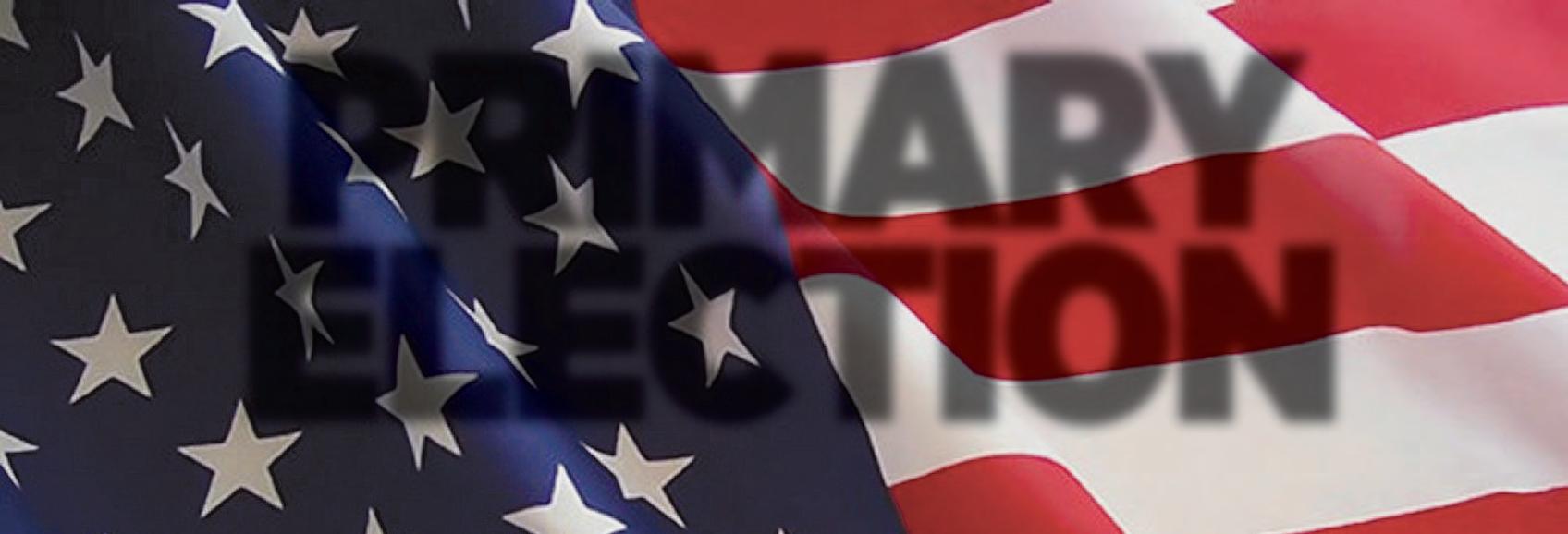
12 | The Jewish Press | March 29, 2024 News LOCAL | NATIONAL | WORLD Howard Kutler | 402.334.6559 | hkutler@jewishomaha.org Contact our advertising executive to promote yourself in this very special edition. Publishing date | 04.12.24 Space reservation | 04.02.24




 ANNETTE VAN DE KAMP-WRIGHT Jewish Press Editor
ANNETTE VAN DE KAMP-WRIGHT Jewish Press Editor




































 RABBI MORDECHAI GEIGER Beth Israel
RABBI MORDECHAI GEIGER Beth Israel









































